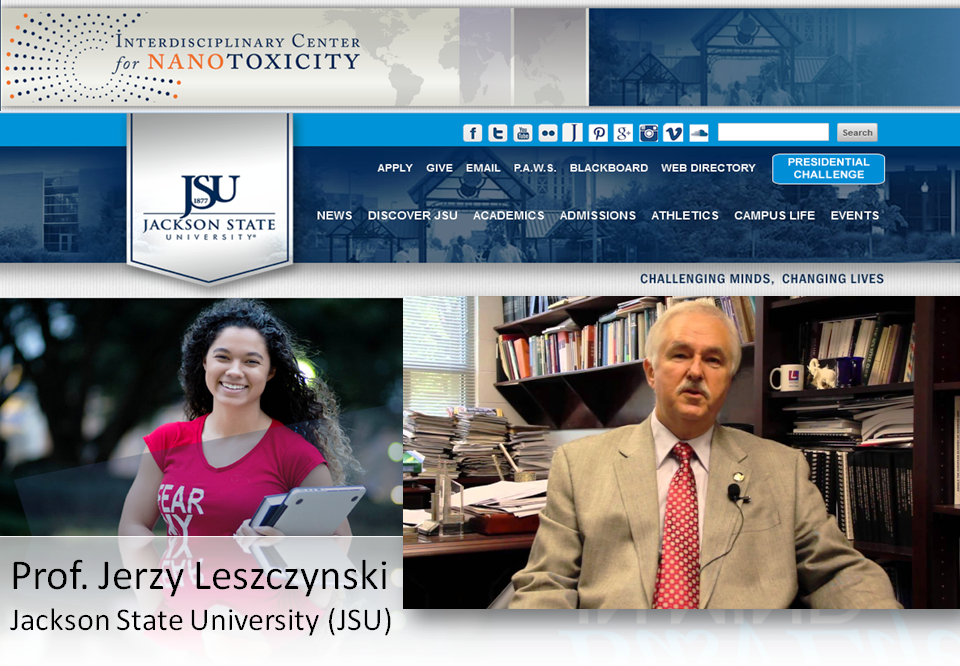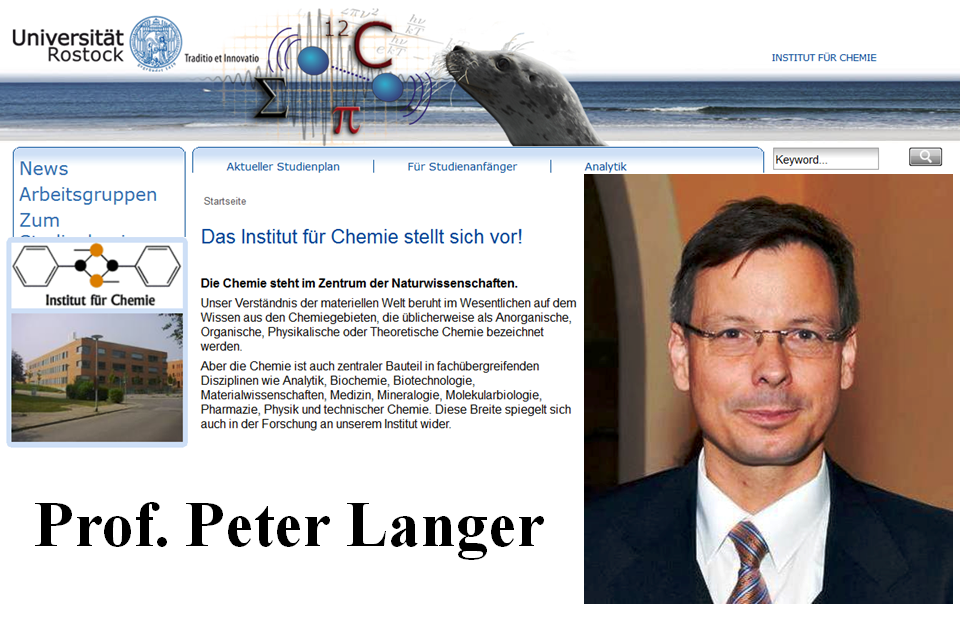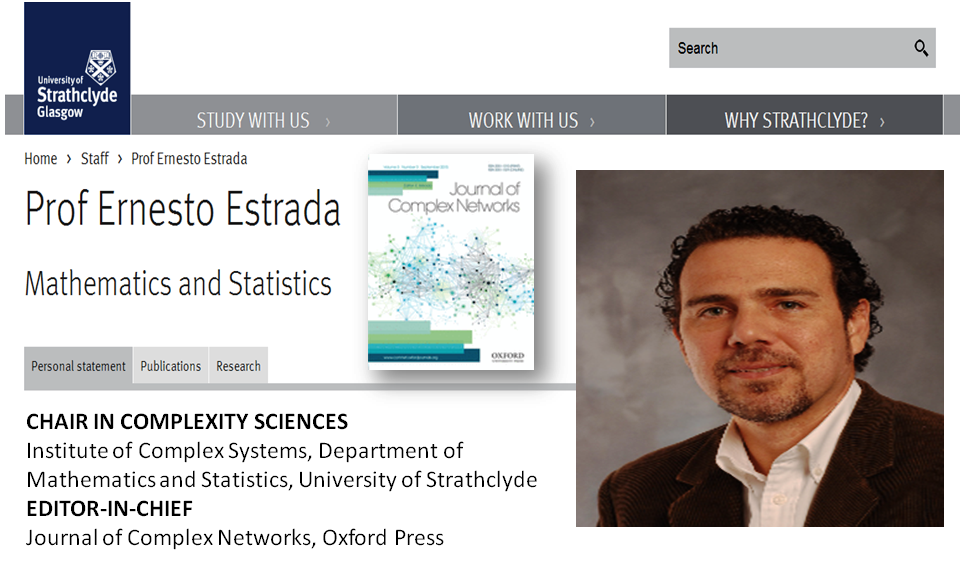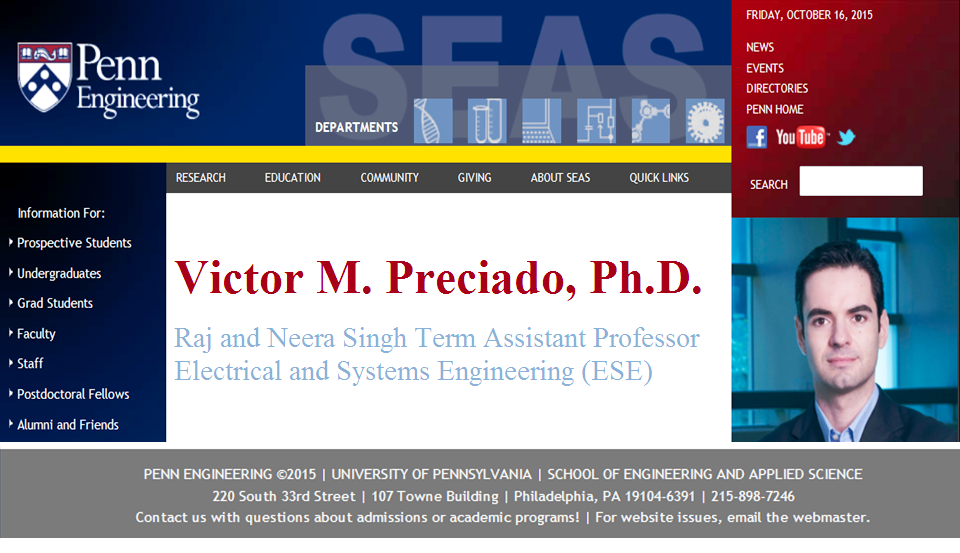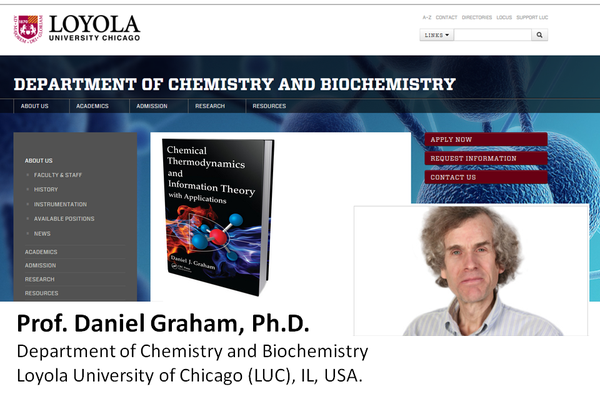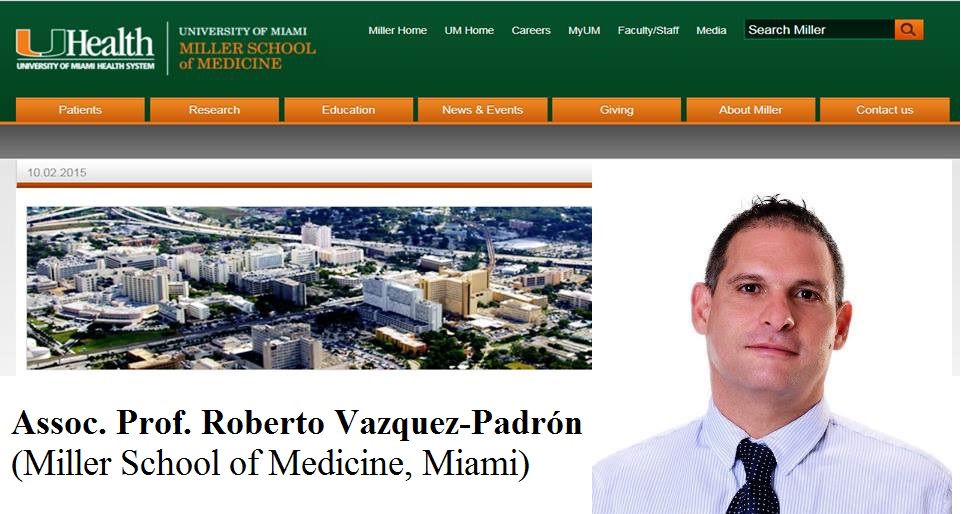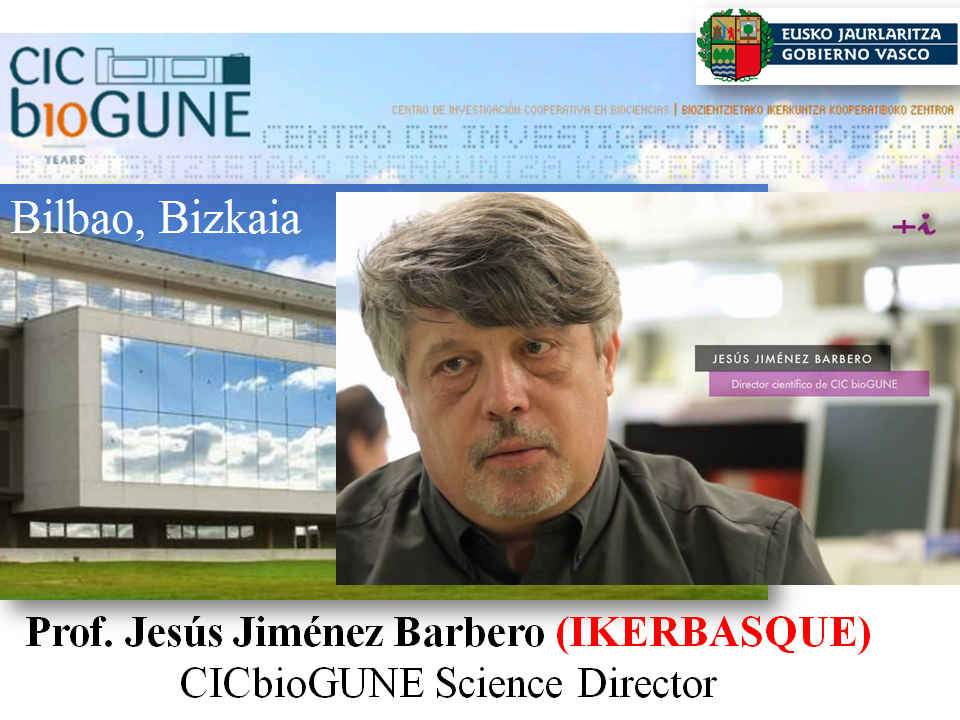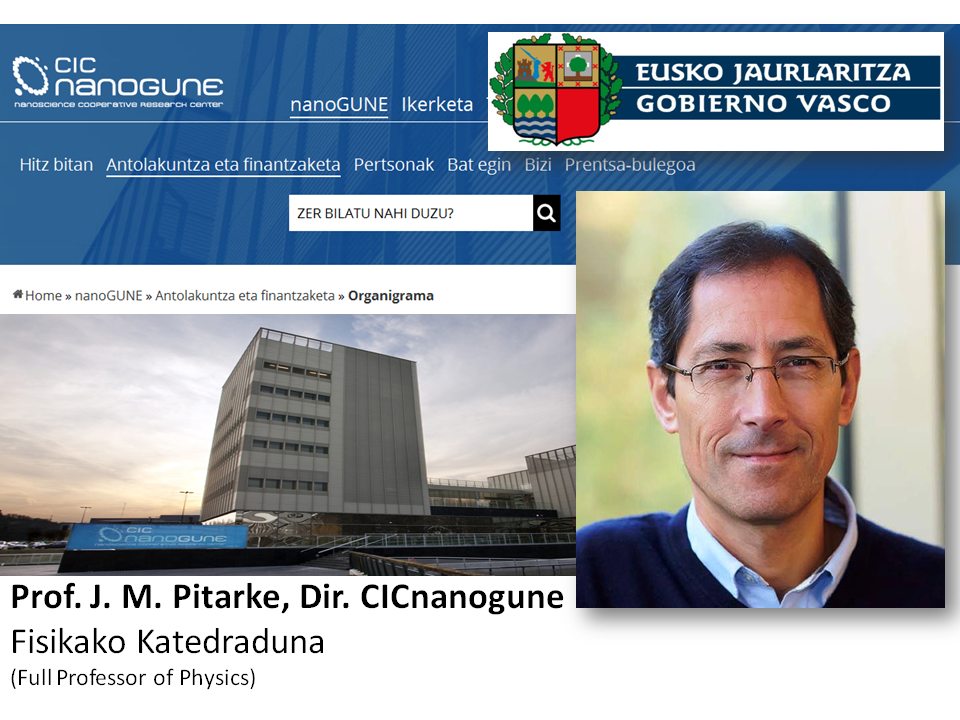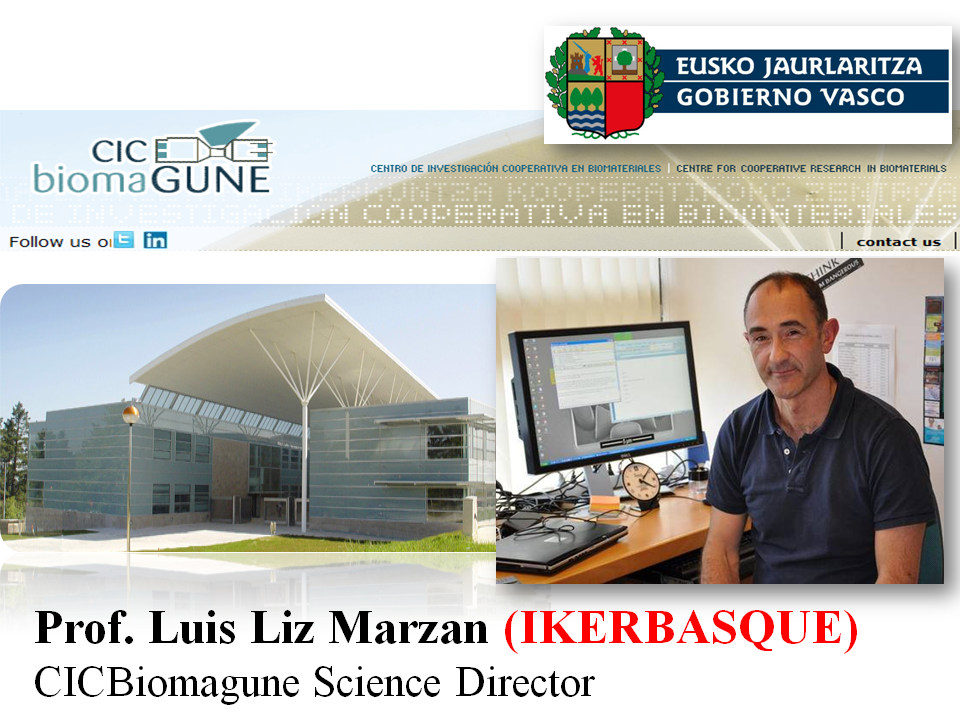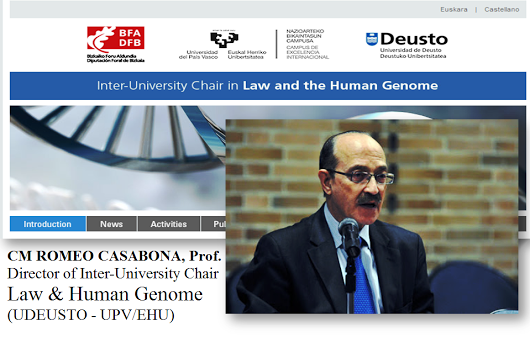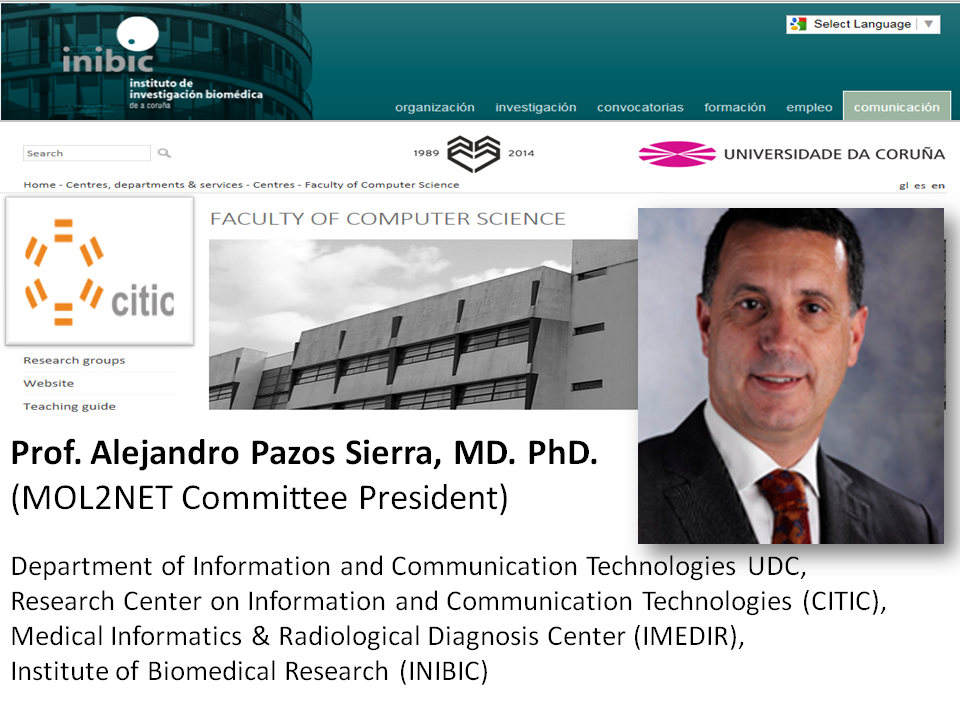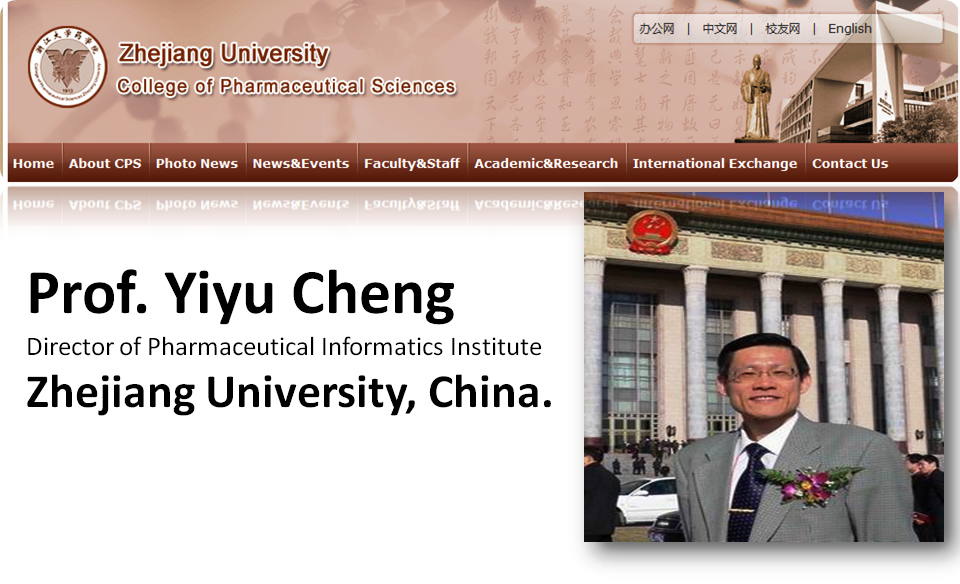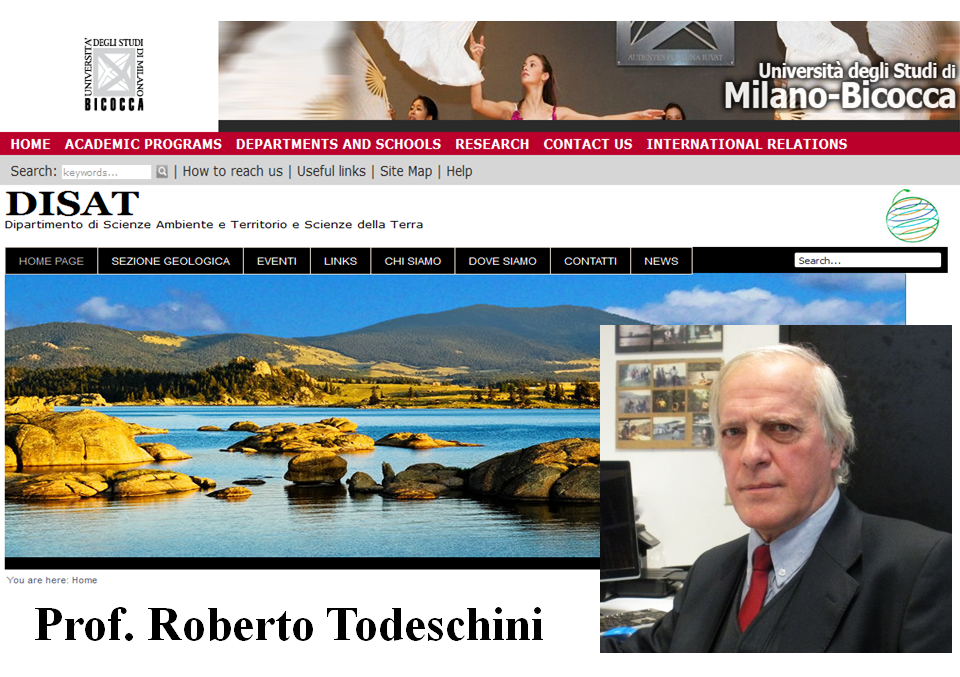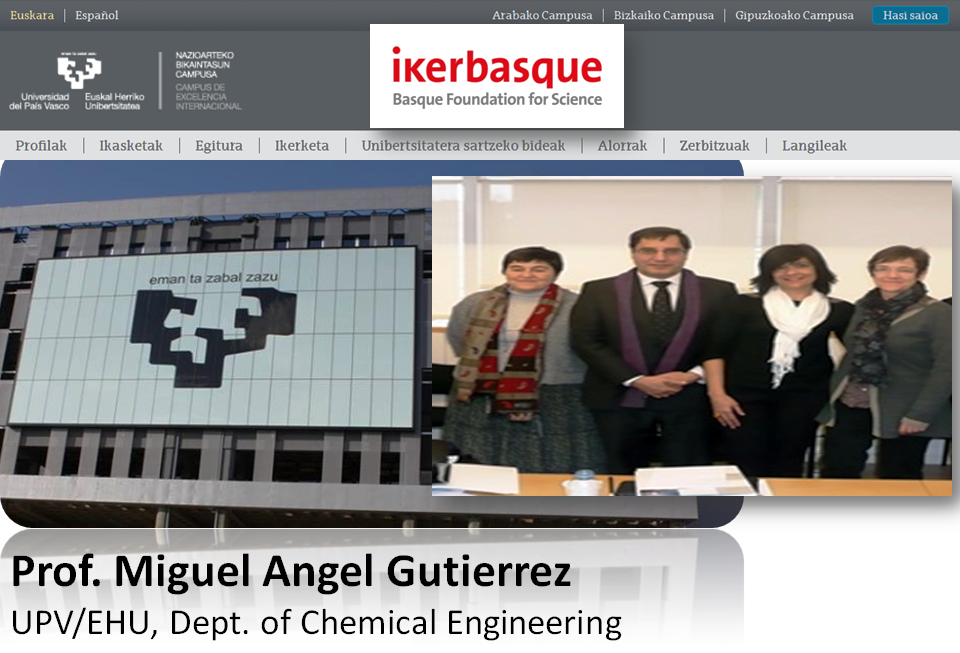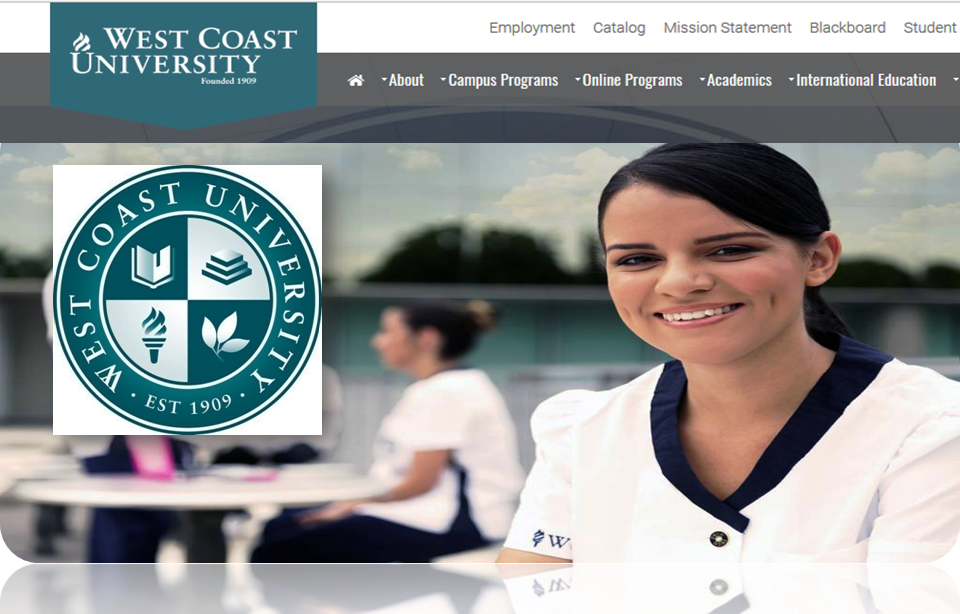
MOL2NET'17, Conference on Molecular, Biomed., Comput. & Network Science and Engineering, 3rd ed.
MOL2NET: FROM MOLECULES TO NETWORKS
15 January–15 December 2017
Chemistry, Computer Science, Biomedical Engineering, Nanotechnology, Regulatory Affairs, artificial intelligence, Materials Science, Pharmaceutical Sciences, Science
- Go to the MOL2NET'17 CONGRESSES
-
- 00. Editorial & Proceedings Book
- 01. CHEMBIOINFO-03: Chem-Bioinformatics Congress Cambridge, UK-Chapel Hill and Richmond, USA, 2017
- 02. CHEMBIOMOL-03: Chem. Biol. & Med. Chem. Workshop, Rostock, Germany-Bilbao, Spain-Galveston, Texas, USA, 2017
- 05. NANOBIOMAT-03: Nanotechnology & Biomaterials Sci. Congress, Jackson & Fargo, USA, 2017
- 06. NICEXSM-03: North-Ibero-American Congress on Exp. & Simul. Methods, Valencia, Bilbao, Spain-Paraiba, Brasil-Miami, USA, 2017
- 08. TECHLAWSCI-01: PANELFIT & NKL H2020 Tech. Law. & Sci. Challenges, Bilbao, Spain, Halden, Norway, Baltimore, USA, 2017
- 03. USEDAT-03: USA-EU Data Analysis Training Prog. Work., Cambridge, UK-Bilbao, Spain-Duluth, USA, 2017
- 09. NATMODECO-02: Nat. Prod., Molec. Sci., Develop. Sust., Environ., Eco., and Econ. Congress, Puyo, Ecuador-Porto, Portugal, 2017.
- 04. MOL2NET'17 ABSTRACTS, REVIEWWWERS Post-Publication Brainstorming and Associated Workshops
- 10. Session 10 (Empty)
- 11. Session 11 (Empty)
- 12. session-12
- 13. session-13
- 14. Session 14 (Empty)
- 14. session-14
- Event Details
-
- Welcome from the Chair
- Conference Chairs
- MOL2NET'17 CONGRESSES
- Instructions for Authors
- List of Accepted Submissions
- List of Authors
- Honor Advisory Committee
- Scientific Committee (Abroad)
- Scientific Committee (Local)
- Co-Chairs Committee
- JCR Journals Special Issues
- Workshops/Sections Schedule
- Notes on Topics
- About This Conference
- IKERBASQUE Committee
Welcome from the Chair

International Partners. Internationally, professors and researchers from Center for the Study of Biological Complexity (CBDS) of Virginia Commonwealth University (VCU), USA; Natural Resources Research Institute (NRRI), University of Minesota (UMN), USA; Miami Dade College (MDC), USA; North Dakota State University (NDSU), USA; Centre National de la Recherche Scientifique (CNRS) and Université Paris-Saclay (UPS), Paris, France, European Bioinformatics Institute (EMBL-EBI) Cambridge, United Kingdom, Universität Rostock Institut für Chemie (UROSTOCK), Germany; and other institutions are co-founders and/or supporters of this conference.
01. CHEMXEDIT-03, Chem. Exp., Edu., & Info. Tech., Bilbao, Spain-Paris, France-Miami, USA, 2017
02. CHEMBIOMOL-03: Chem. Biol. & Med. Chem. Workshop, Rostock, Germany-Bilbao, Spain-Galveston, Texas, USA, 2017
03. USEDAT-03: USA-EU Data Analysis Training Prog. Work., Cambridge, UK-Bilbao, Spain-Duluth, USA, 2017
04. SRI-09: 9th Summer Research Institute Symposium, STU-MDC, Miami, USA, 2017
11. NANOBIOMATJND-02: JSU-NDSU Nanotech. & Mat. Sci. Workshop, Jackson & Fargo, USA, 2017
07. NIXMSM-03: North-Ibero-Am. Exp., Model. & Simul. Meth. Work., Valencia, Bilbao, Spain-Paraiba, Brasil-Miami, USA, 2017
08. LAWSCI-01: Challenges in Law, Technology, Life, and Social Sciences, UPV/EHU, Bilbao, Spain, 2017
09. MODECO-02: Workshop on Molecular Diversity & Ecosystems, Puyo, Ecuador-Porto, Portugal, 2017
10. EJIBCE-01; Meeting of Young Researchers in Structural Computational Biology, UC, Coimbra, Portugal, 2017
MOL2NET-MDPI JCR Journals Issues
 https://orcid.org/0000-0002-9392-2797, Email: mol2net.chair@gmail.com
https://orcid.org/0000-0002-9392-2797, Email: mol2net.chair@gmail.com(1) Dept. of Organic and Inorganic Chemistry and Basque Center for Biophysics, University of the Basque Country UPV/EHU , 48940, Leioa, Biscay, Spain. (2) IKERBASQUE, Basque Foundation for Science , 48011, Bilbao, Biscay, Spain.
Conference Chairs
Dept. of Organic and Inorganic Chemistry, University of The Basque Country UPV/EHU, Leioa, 48940, Greater Bilbao, Basque Country, Spain. Website
mol2net.chair@gmail.com
MOL2NET'17 CONGRESSES
01. CHEMBIOINFO-03: Chem-Bioinformatics Congress Cambridge, UK-Chapel Hill and Richmond, USA, 2017
02. CHEMBIOMOL-03: Chem. Biol. & Med. Chem. Workshop, Rostock, Germany-Bilbao, Spain-Galveston, Texas, USA, 2017
05. NANOBIOMAT-03: Nanotechnology & Biomaterials Sci. Congress, Jackson & Fargo, USA, 2017
06. NICEXSM-03: North-Ibero-American Congress on Exp. & Simul. Methods, Valencia, Bilbao, Spain-Paraiba, Brasil-Miami, USA, 2017
08. TECHLAWSCI-01: PANELFIT & NKL H2020 Tech. Law. & Sci. Challenges, Bilbao, Spain, Halden, Norway, Baltimore, USA, 2017
03. USEDAT-03: USA-EU Data Analysis Training Prog. Work., Cambridge, UK-Bilbao, Spain-Duluth, USA, 2017
09. NATMODECO-02: Nat. Prod., Molec. Sci., Develop. Sust., Environ., Eco., and Econ. Congress, Puyo, Ecuador-Porto, Portugal, 2017.
04. MOL2NET'17 ABSTRACTS, REVIEWWWERS Post-Publication Brainstorming and Associated Workshops
10. Session 10 (Empty)
11. Session 11 (Empty)
12. session-12
13. session-13
14. Session 14 (Empty)
14. session-14
Instructions for Authors
The MOL2NET conference runs both online (general sections) and/or in person (associated workshops); no physical presence is needed for online participation saving traveling costs. We accept experimental works, theoretical works, or experimental-theoretic works in the areas mentioned. Proceedings will be Published Online, Open Access, and Totally Free of Charges (no cost). For details about in person (face-to-face) participation on associated workshops contact the respective members of the local committees.
Before to submit your communication recommend to download and use the template file below to write your communication; we strongly recommend you to read carefully the following notes to participants about publication model, copyright, authors responsibilities, etc.
Before to submit your work be aware that the works published here belongs to two main modalities preliminary communications or comments on previous works.
Preliminary communications are not post-print journal papers. In this sense, committee and/or external reviewers check only scope and apparent scientific soundness. They have the same editorial process than for an online Preprint service. Therefore, all works receive doi number and are indexed in databases (GoogleScholar, Publons, etc.).The works may receive also comments from registered participants (public post-publication review). The authors are encouraged to submit their works to a peer-reviewed scientific journals of MDPI or other editorials during or after finalization of the conference, as per SciForum copyright rules.
Research Highlights are comments on previous works, they are short notes devoted to comment about the more interesting points, update some topics, highlights, etc. of works previously published by the authors or other groups. In this case, committee and/or external reviewers check also only scope and apparent scientific soundness. The works may receive also comments from registered participants (public post-publication review).
In any case, it is the duty and responsibility of the authors solely, to ensure the veracity of the contents, checking similarity to other works, and carry out a proper citation of previous works. The committee is not responsible of this previous aspects in this publishing modality. In this sense, we strongly recommend the authors to use online text-similarity checking services to avoid any form of plagiarism or copyright violation. The authors may be requested to modify the communication (re-write their texts) in the case that high similarity is detected and reported to the committee. In these cases, the manuscript could be put on standby or withdrawn temporarily until the authors re-submit the proper version. The authors are also allowed to submit short reviews, comments, letters, or discussions of papers already published if they guarantee sufficient difference to previous public contents.
List of accepted submissions (175)
| Id | Title | Authors | Poster PDF | ||||||||||||||||||||||||||||||||||||||
|---|---|---|---|---|---|---|---|---|---|---|---|---|---|---|---|---|---|---|---|---|---|---|---|---|---|---|---|---|---|---|---|---|---|---|---|---|---|---|---|---|---|
| sciforum-012017 | Doctrinal considerations regarding administrative easement definition |

|
Show Abstract |
||||||||||||||||||||||||||||||||||||||
|
The Public Administration, in its function of satisfying the interests of the collective, and taking into account the principle of legality and the corresponding legal guarantees, often requires things of personal property for reasons of public utility or social interest. These cases include: compulsory expropriation, temporary occupation, limitations and administrative easements; all them legal institutions regulated by Administrative Law. Administrative easements arise to respond to the needs of social existence. They have evolved from civil servitudes to an institution of Administrative Law. How many times it has become necessary to provide electrical or water services that the poles, towers or pipes are located on lands that are not public property? It is of public utility to receive an adequate electrical service and aqueduct service, and for this, administrative easements are indispensable. These easements allow to obtain advantages, for the benefit of the collective. Several aspects of this legal institution have not yet achieved a uniform approach between the branches of Civil and Administrative Law. Those aspects include: conceptual delimitation, legal nature, fundamental characteristics of the institution, and its distinction with other related institutions, diversity of classification approaches, or the adequate manner of compensation. This situation creates confusion regarding the institution, which affects its theoretical, legislative and jurisprudential treatment and, as a consequence, affects legal certainty. This article discusses the approaches to the controversial definition of administrative easements."[1]. According to ALBALADEJO, the servitude consists of the real power over the property of others to make partial use of it. He adds that it is not possible a better delimitation of the concept because the power, object and content of these institution can include very different situations[2]. It is also recurrent to find that servitude is considered as a real, perpetual or temporary right of one or more persons over the property of others, with a certain right over its usefulness [3]. Previous definitions constitute a minimum reference of the long list of approaches about this institution from the Civil Law doctrinal perspective. Nonetheless, common elements can be appreciated. It is not possible to determine with complete precision a definition of easements, which allows us to identify them convincingly in relation to other legal institutions that also have an impact on property rights. There is no identity between civil and administrative easements. Although servitudes of public utility come from civil servitudes, the individuality of each is undeniable, especially because administrative easements have their cause in public utility or social interest, which permeates the characters and the legal regime Administrative procedures. JOUSSELIN is one of the first authors to note that easements of public utility are modifications to real property made in favor of public utility, as determined by laws and regulations. In such a case, the institution of public easements would contain the whole legal system of property, without recognizing distinctions between limitations, charges, obligations, temporary occupation or expropriation.[4] For OTTO MAYER the definition is more restricted. It refers to the fact that public law easement is a partial legal power constituted on property in favor of a public company.[5] In contrast, BIELSA considers administrative easement a real right, constituted by a public entity (state, county or commune) on a private land, with the objective of serving the public use as an extension or dependence of the public domain. This conception finds several followers in the administrative doctrine, because they recognize in the administrative easements a real right over the other´s thing in order to serve the public interests, real right that ends up being part of the public domain. An almost unanimous element in doctrine is the reference to the general interest as the cause for establishing administrative servitude. GARCINI recognizes this element expressly. Although it limits the conception of administrative easements to the burdens that can fall on properties originated not by the necessity of another private thing that is adjacent to her, but by the closeness of public things..[6] For GARRIDO FALLA, closeness is not an essential element of administrative easements, but the partial subjection of the immovable to a use by the collective.[7] The above definitions show the diversity of approaches to administrative easements, which confirms the difficulty of uniformity. The elements that often converge are: they are recognized as a real right, are constituted on the property of others, and respond to public interests. These common elements are not enough to identify administrative easements in the juridical traffic. Its complexity is given by the lack of delimitation of its contours and to achieve a more suitable definition. The administrative easement is the real right whose content includes the use or improvement of the thing property of other, for reasons of public utility or social interest, without it is indispensable reciprocity, or vicinity. For example, there is an administrative easement when the Public Administration in other people's property requires establishing pipes, posts or electric cables; or establishment the sign that identify the name of the streets. However, do not constitute servitudes, some figures historically conceived as such, for example: the prohibition to build beyond a certain height, or to build on the strip of roads and railways. In summary, in order to qualify an easement as an administrative one, real use of the private property of other persons for reasons of public utility or social interest is required. [1] Díez Picazo, L. y Gullón, A. Sistema de Derecho Civil. Volumen III. Derecho de cosas y Derecho Inmobiliario Registral. Sexta Edición. Editorial Tecnos. SA. Madrid. 1997. Pág. 434. [2] Albaladejo, M. Derecho Civil. Tomo III. Volumen segundo. Quinta edición. Editorial Bosch. Barcelona. 1983. Pág. 94. [3] Véase Gatti, E – Alterin, J.H El derecho real. Elementos para una teoría general. Reimpresión. Abeledo-Perrot. Buenos Aires. 1998. Pág. 99. [4] Citado por Gascón y Marín, J. Limitaciones del derecho de propiedad por interés público. Establecimiento tipográfico de Jaime Ratés. Madrid. 1906. Pág. 33. [5] Mayer, O. Derecho administrativo alemán. Editorial De Palma. Buenos Aires. 1951. Pág. 272. [6] Garcini, H. Derecho Administrativo. Editorial Pueblo y Educación. La Habana.1986. Pág.184. [7] Garrido Falla, F. Tratado de Derecho administrativo, Vol. II, Thirteenth edition. Madrid. 2012. Pág. 284. |
|||||||||||||||||||||||||||||||||||||||||
| sciforum-012018 | Genetic Manipulation on Plants: Intellectual Property Issues. | , |

|
Show Abstract |
|||||||||||||||||||||||||||||||||||||
|
Biotechnology and specifically, the plan genome manipulation is a matter that needs to be reconsidered by the juridical traditional frame, in order to adequate the norm to the new scientific advances. Intellectual Property recognizes patent rights on products which include biological material, as well as new vegetable varieties obtained, it could mean a limitation for the access to such class of product or plant variety. This work deals with some aspects of Biotechnology regarding to plant genomic, as well as the intellectual property´s legal issues in this matter. Reference: Plants genetic manipulation: an approach from Intellectual property. Anisley Negrin Ruiz1, 2,3, Lazaro Pino Rivero4 Frontiers in Bioscience E5, 408-417, January 1, 2013 |
|||||||||||||||||||||||||||||||||||||||||
| sciforum-012377 | New insights to understand the CoMFA and CoMSIA analysis within the framework of Density Functional Theory. Toward a generalized methodology. |

|
Show Abstract |
||||||||||||||||||||||||||||||||||||||
|
Currently, the three-dimensional quantitative structure-activity relationship (3D QSAR) models have many applications; however due to the complexity to understand its results is necessary postulate new methodologies. In this sense, this work postulates a generalized version joining the quantum similarity field and chemical reactivity descriptors within the framework of density functional theory.
This generalized methodology can be applied to understand the biological activity on a molecular set taking a reference compound. In this sense, this methodology allows study the CoMFA and CoMSIA results in term of quantum similarity and chemical reactivity (J 2015 J. Mol. Model. 21, 156). In this form, is possible study steric and electrostatic effect on local substitutions. Considering that these methodologies can be used when the receptor is known or even when it is not known. |
|||||||||||||||||||||||||||||||||||||||||
| sciforum-012370 | METHODOLOGY FOR DESIGNING AN AGRICULTURAL COMMODITY LOGISTICS INFORMATION SYSTEM | , , , , |

|
Show Abstract |
|||||||||||||||||||||||||||||||||||||
|
This project is born from the needs of Chontla Municipality which is located in Veracruz, México to allow small agricultural producers to have a tool for making decisions about their commercialization and production planning. It is proposed to design and validate statistically a measurement instrument in the form as a survey applicable to small agricultural producers. The results obtained will be used to design the logistics and management indicators that will serve as a strategic resource to empower the municipality and achieve a substantive contribution in the agricultural commodities information systems, thus contributing to local economic development. It is proposed to apply the Checkland systemic methodology, data statistical analysis and software development methodologies. |
|||||||||||||||||||||||||||||||||||||||||
| sciforum-012427 | Prediction of mRNA expression in cow’s milk using mRNA secondary structures and Machine Learning classifiers | , , , , , , , |

|
Show Abstract |
|||||||||||||||||||||||||||||||||||||
|
The mRNA molecules expressed in cow’s milk are important molecular biomarkers for different physiological and pathological conditions in cattle. The prediction of the quantity that a specific mRNA type could be expressed in cow’s milk is a challenging theoretical task. The current study presents for the first time several different Machine Learning models to predict the mRNA expression using the mRNA secondary structure fragments. This unique methodology is based on a dataset of experimental mRNA expression data. Each mRNA molecule has a specific secondary structure represented as a string that can be used to read all the possible mRNA secondary structure fragments. This information is used as input for the Machine Learning methods from Weka software in order to obtain classification models that can predict low, medium and high expression of new mRNA types in the cow’s milk. The mRNA expression levels have been measured with High Throughput Screening techniques. The initial features included the counting of the mRNA secondary structure fragments for each expressed mRNA. The model features were transformed in frequencies and the expression levels were converted into low and high classes. In order to reduce the high number of possible features, a feature selection method has been applied. Thus, the best classification model was obtained with BayesNet method and is based on 24 features and 4067 cases. The model has the true positive rate for the low mRNA expression class of 0.78 (average true positive rate of 0.66). Further studies are needed improve the current results, using datasets with different feature sets and more advanced Machine Learning methods. |
|||||||||||||||||||||||||||||||||||||||||
List of Authors (487)
Honor Advisory Committee
|
|
|
|
|
|
|
|
|
|
|
|
|
|
|
|
|
|
|
|
|
|
|
|
|
|
|
|
|
Thank you for your support!!! MOL2NET Chairman Prof. González-Díaz H., IKERBASQUE Professor, Email: gonzalezdiazh@yahoo.es |
Scientific Committee (Abroad)
Presidents of the Abroad Scientific Committee
President of Scientific Committee (Polymers & Materials Sciences)
Assist. Prof. Bakhtiyor RasulevDepartment of Coatings and Polymeric Material, |
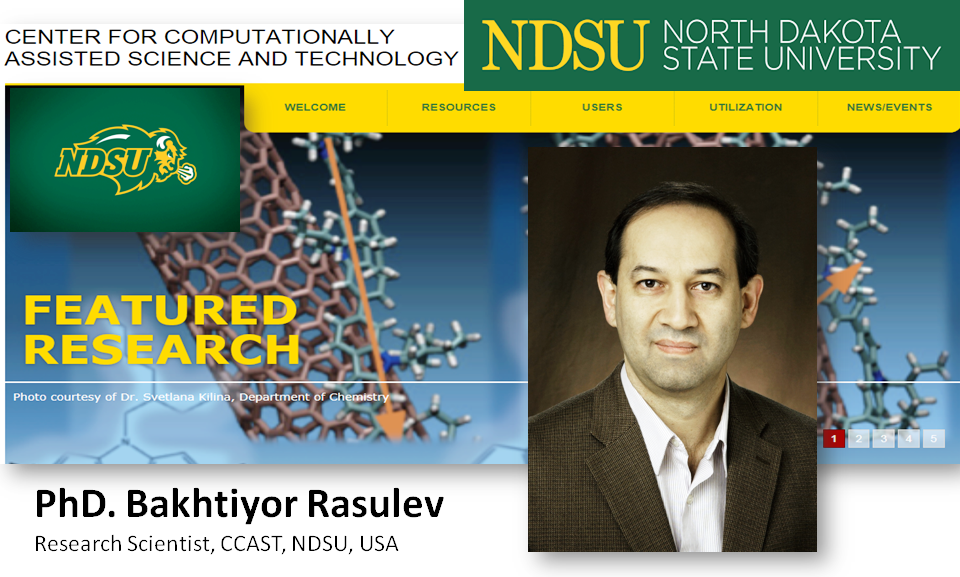 |
President of Scientific Committee (Computational Chemistry and Nanosciences)
Prof. Natalia D.S. CordeiroProfessor of Computational Chemistry Department of Chemistry and Biochemistry, |
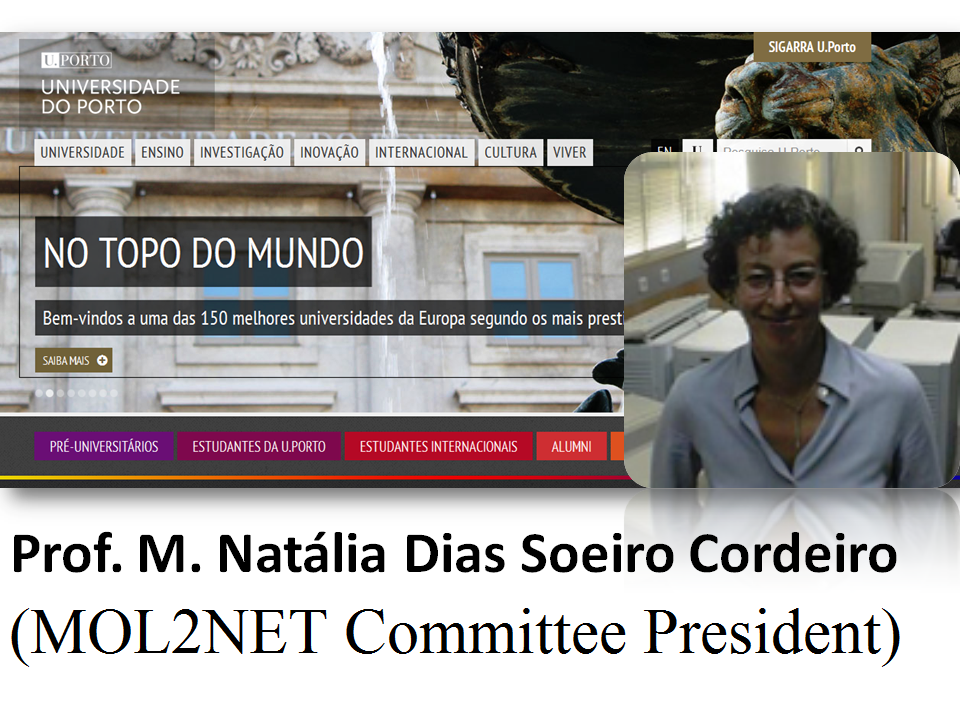 |
President of Scientific Committee (Experimental Chemistry)
Dr. Maité Sylla
(Assoc. Professor) Conservatoire National des Arts et Métiers (CNAM), Equipe de Chimie Moléculaire, Laboratoire de Chimie Moléculaire, Génie des Procédés Chimiques et énergétiques, CMGPCE, EA7341. Bureau 31.4, Accès 31, 4ème étage 2 rue Conté 75003 Paris, France. maite.sylla@lecnam.net |
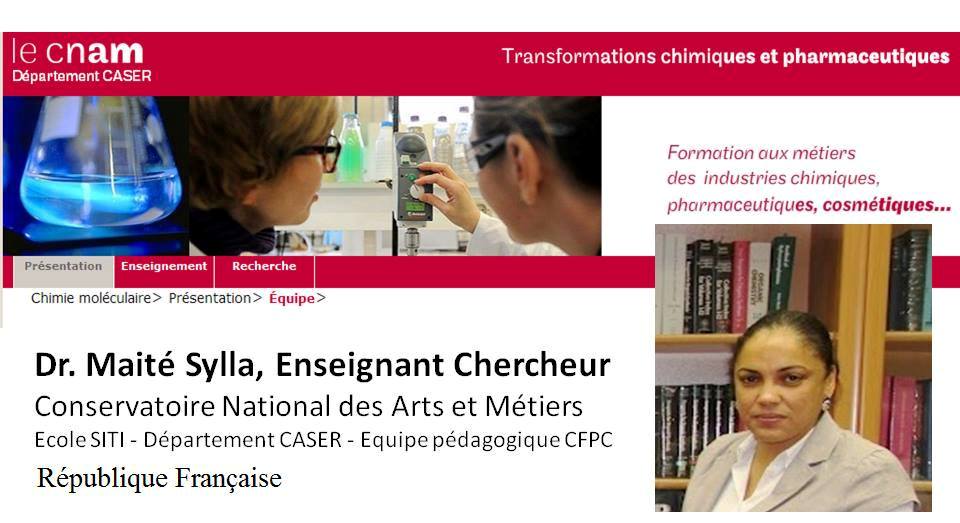 |
President of Scientific Committee (Physics, Environmental, and Atmospheric Sciences)
Dr. David QuesadaAssociate Professor of Physics, School of Science, Technology, and Engineering Management St. Thomas University, Miami, FL, USA |
 |
[Honor Committee]
[Scientific Committee (Abroad)]
[Scientific Committee (Local)]
Abroad Scientific Committee (North America)
Prof. James J. Chou, Department Biological Chemistry & Molecular Pharmacology (BCMP), Harvard Medical School, Boston, USA.
Prof. Maykel Cruz-Monteagudo, FCT Fellow, Univ. of Porto; Consultant, Univ. of Miami, Full Prof. West Coast University, FL, USA.
Prof. James Robert Green, Assoc. Prof., Dept. of Systems and Computer Engineering, Carleton University, Ottawa, Canada.
Prof. William H Bisson, Assist. Prof.. Dept. of Environ. & Molecular Toxicology, Oregon State University, OR, USA.
Dr. Jose A. Seoane, Research Associate, Stanford Cancer Institute, Stanford University, Stanford, CA, USA.
Dr. Natalia Sizochenko, ICN, Dept. of Chemistry and Biochemistry, Jackson State University, Jackson, MS, USA.
Dr. Vanessa Aguiar-Pulido, Research Associate, Weill Cornell Medical College, New York City, NY, USA.
Dr. Robersy Sánchez, Eberly College of Science, Huck Institutes of the Life Sciences, The Pennsylvania State University, USA.
Dr. Marta G. Lete, Texas A&M Health and Science Center, Dept. of Molecular and Cellular Medicine, College Station, TX, USA.
Dr. Santiago Vilar Varela, Research Associate, Department of Systems Biology, Columbia University, USA.
Dr. Advait Apte, Scientific Programmer, Department of Biology, City College of New York, New York, NY, USA.
Dr. Shameer Khader, Philips Healthcare, Philips Research Americas, 2 Canal Park Cambridge, MA, USA.
Dr. Diana María Herrera-Ibatá, Research Associate, Kansas State University, Manhattan, KS, USA.
Dr. Gerardo Casañola-Martín, Visiting Fellow, Dept. of Systems and Computer Engineering, Carleton University, Canada.
Members of Scientific Committee (Europe)
Prof. Ricardo Grau-Crespo, Lecturer Department of Chemistry, University of Reading, Reading, United Kingdom.
Prof. Adriana Chilin, Department of Pharmaceutical and Pharmacological Sciences, University of Padova, Padova, Italy.
Prof. Fernanda Borges, Department of Chemistry and Biochemistry, University of Porto, Portugal.
Dr. Hector M. Díaz-Albiter, Wellcome Trust Centre for Molecular Parasitology, University of Glasgow , United Kingdom.
Dr. Yasset Perez-Riverol, EMBL-EBI, Wellcome Trust Genome Campus, Hinxton, Cambridge, United Kingdom.
Dr. Luisa Di Paola, Department of Engineering, Università Campus Bio-Medico, Rome, Italy.
Dr. Agnieszka Gajewicz, Assist. Prof., Faculty of Chemistry, University of Gdansk, Gdansk, Poland.
Dr. Hugo Gutiérrez-de-Terán, Department of Cell and Molecular Biology, Uppsala University, Sweden.
Dr. Irina Moreira, FCT Investigator, University of Coimbra, and Marie Curie Fellow at Utrecht University, Netherlands.
Dr. Giovanni Marzaro, Department of Pharmaceutical and Pharmacological Sciences, Padua University, Padua, Italy.
Dr. Riccardo Concu, FCT Post-doctoral Researcher, University of Porto, Porto, Portugal.
Porf. Igor Iosifovich Baskin, M.V. Lomonosov Moscow State University, Moscow, Russia.
Members of Scientific Committee (Other Regions)
Prof. Kazuhiro Takemoto, Assoc. Prof., Dept. of Bioscience and Bioinformatics, Kyushu Institute of Technology, Japan.
Prof. Kunal Roy, Department of Pharmaceutical Technology, Jadavpur University, Kolkata, India.
Prof. Yovani Marrero-Ponce, University San Francisco de Quito, Cumbayá, Quito, Ecuador.
Prof. Carolina Horta Andrade, Universidade Federal de Goias, Setor Leste Universitario, Goiania, Brazil.
Prof. Marcus T Scotti, Universidade Federal da Paraíba, Campus IV, Paraíba, Brazil.
Dr. Anuraj Nayarisseri, Principal Scientist, Eminent Biosciences, Vijaynagar, Indore, Madhya Pradesh, India.
Prof. Xiaoke Zhou, Assist. Prof., School of Computer Sciences and Technology, Soochow University, Suzhou, China.
Soft. Eng. Jorge Naranjo, HPC Applications Specialist, New York University (NYU), Abu Dhabi, UAE.
Thank you for your support!!!
MOL2NET Chairman
Prof. González-Díaz H., IKERBASQUE Professor, Email: gonzalezdiazh@yahoo.es
(1) Department of Organic Chemistry II, University of the Basque Country UPV/EHU , 48940, Leioa, Biscay, Spain.
(2) IKERBASQUE, Basque Foundation for Science , 48011, Bilbao, Biscay, Spain. ![]() ORCID: https://orcid.org/0000-0002-9392-2797
ORCID: https://orcid.org/0000-0002-9392-2797
Scientific Committee (Local)
Coordinator Local Committee (Chemical Sciences)
Prof. Sonia ArrasateDepartment of Organic Chemistry II, University of Basque Country (UPV/EHU), Leioa, Sarriena w/n, Bizkaia. Email: sonia.arrasate@ehu.eus |
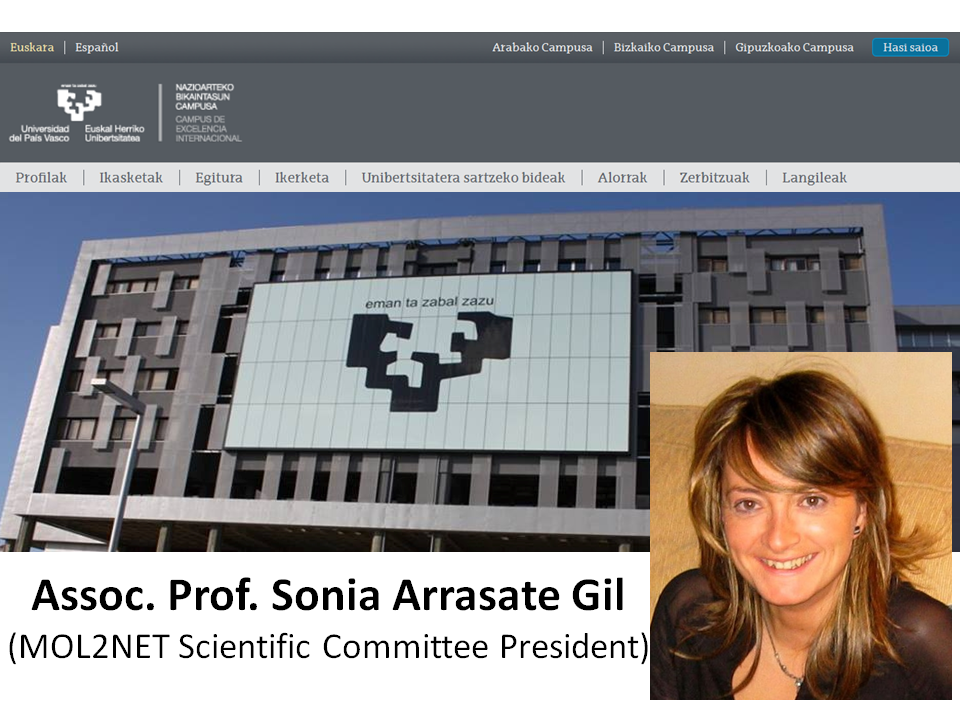 |
Coordinator Scientific Committee (Neurosciences)
Prof. Shira KnafoIKERBASQUE Professor Biophysics Institute (CSIC, UPV/EHU)
Scientific and Technological Park of Biscay, University of The Basque Country UPV/EHU, Biscay, Spain. Ikerbasque, Basque Foundation for Science.
|
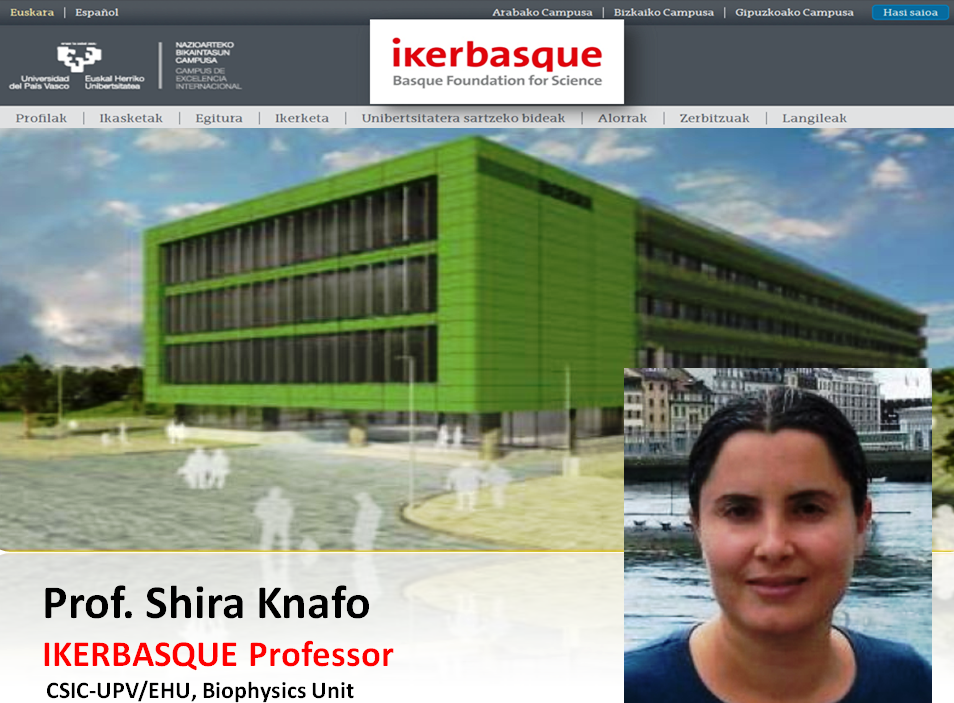 |
Coordinator Scientific Committee (Physical Sciences)
Prof. Juan M. RusoDepartment of Applied Physics, Faculty of Physics, University of Santiago de Compostela (USC), Spain. Email: juanm.ruso@usc.es |
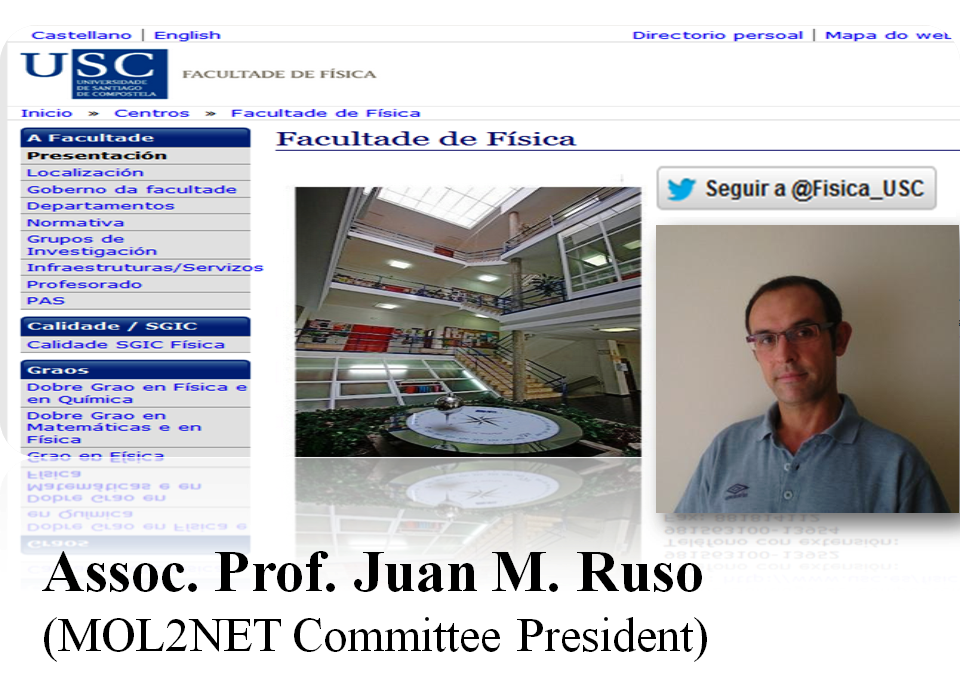 |
Coordinator Scientific Committee (Computer Sciences)
Prof. Cristian R. MunteanuDepartment of Computation, University of Coruña (UDC), A Coruña, Spain. Email: muntisa@gmail.com |
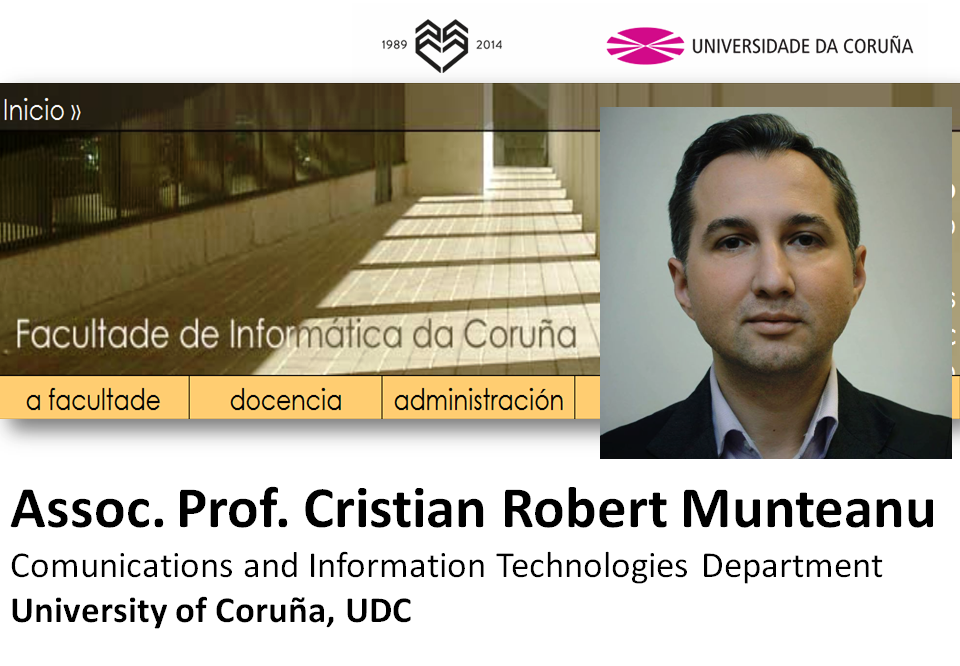 |
[Honor Committee]
[Scientific Committee (Abroad)]
[Scientific Committee (Local)]
Scientific Committee Members
BioDonostia Health Research Institute
Prof. Marcos J. Araúzo-Bravo, Ikerbasque Professor, Bioengineering
CIC bioGUNE, Center for Cooperative Research in Biosciences
Prof. Nicola Abrescia, Ikerbasque Professor, Structural Virology Laboratory
University of Santiago de Compostela (USC)
Prof. Eugenio Uriarte Villares, Dept. of Organic Chemistry, USC, Spain.
Prof. Florencio Martínez Ubeira, Dept. of Microbiology and Parasitology, USC, Spain.
Prof. María Isabel Loza, Department of Pharmacology, USC, Spain.
Prof. Ramón J. Estévez Cabanas, Dept. of Organic Chemistry, USC, Spain.
Prof. Julio Seijas Vasquez, Dept. of Organic Chemistry, USC, Spain.
Prof. Carmen Cadarso-Suarez, Dept. Stat. and Operations Research, USC, Spain.
Assoc. Prof. Angeles Sánchez, Dept. of Inorganic Chemistry, USC, Santiago, Spain.
Assoc. Prof. Xerardo García Mera, Department of Organic Chemistry, USC, Spain.
Assoc. Prof. Eddy Sotelo, Dept. of Organic Chemistry, USC, Spain.
University of Vigo (UVIGO)
Prof. Yagamare Fall, Dept. of Organic Chemistry, University of Vigo (UVIGO), Vigo, Spain.
University of Cantabria (UC)
Prof. Jose Angel Irabien Gulias, Dept. of Chemical and Biomolecular Engineering ETSIIT, University of Cantabria, Spain.
University of Barcelona (UB)
Prof. Francesc Illas Riera, Institute of Theoretical and Computational Chemistry (IQTCUB), University of Barcelona, Spain.
Prof. Javier Luque Garriga, Department of Physical Chemistry, Universitat de Barcelona, Barcelona, Spain.
Consejo Nacional de Investigaciones Científicas (CSIC)
Prof. Pilar Goya, Institute of Medicinal Chemistry (IQM), CSIC, Juan de la Cierva st., Madrid, Spain.
Ph.D. Sonsoles Martin-Santamaría, Staff Scientist, CIB-CSIC, Mardid, Spain.
University of Valencia (UV)
Prof. Jorge Gálvez, Dept. of Physical Chemistry, Faculty of Pharmacy, University of Valencia, Spain
Prof. Ramon García Domenech, Dept. of Physical Chemistry, Faculty of Pharmacy, Universitat de Valencia, Spain.
Universidad Politecnica de Madrid
Prof. Victor Maojo, M.D. Ph.D., Biomedical Informatics Group, Polytechnic University of Madrid, Spain.
Universida Complutense de Madrid
Prof. J. Carlos Mendez Ramos, Dept. of Organic Chem. and Pharm. Chem., Complutense University of Madrid, Spain
University of Girona
Prof. Emili Besalú Liora. Institut de Química Computacional i Catàlisi (IQCC), University of Girona, Spain.
University of Alicante
Assoc. Prof. José C. González-Gómez, Dept. of Organic Chemistry, University of Alicante, Alicante, Spain
Institute of Health Carlos III
PhD. Tirso Pons Hernández, Staff Scientist, CNIO, Institute of Health Carlos III, Madrid, Spain.
Scientific Committee Members (UPV/EHU)
UPV/EHU Headquarters Institutional Members
Prof. Carmen Iriondo Gabilondo, Head Dept. of Organic Chemistry II, UPV/EHU, Biscay, Spain.
Prof. Mª Isabel Moreno, Academic Secretary Dept. of Organic Chemistry II, UPV/EHU, Biscay, Spain.
UPV/EHU Committee Members
Prof. Claudio Palomo Nicolau, Director Department of Organic Chemistry I, UPV/EHU, Campus Gipuzkoa
Prof. Francisco Palacios Gambra, Department of Organic Chemistry I, UPV/EHU, Campus Vitoria
Prof. Jose Luis Vicario, Department of Organic Chemistry II, UPV/EHU, Campus Biscay
Prof. M.D. Javier Meana, Department of Pharmacology, Faculty of Medicine, UPV/EHU, Campus Biscay
Prof. Néstor Etxebarria Loizate, Dept. Analytical Chemistry, UPV/EHU, Campus Biscay
Prof. Luis Lezama, Department of Inorganic Chemistry, UPV/EHU, Campus Biscay
Prof. Mario Piris, Ikerbasque Prof., Donostia International Physics Center (DIPC), UPV/EHU, Campus Gipuzkoa
Assoc. Prof. Maria Luisa Carrillo Fernández, Dept. of Organic Chemistry II, UPV/EHU, Campus Biscay
Assist. Prof. Efraim Reyes Martín, Department of Organic Chemistry II, UPV/EHU, Campus Biscay
Assoc. Prof. Inmaculada Arostegui, Dept. of Applied Mathmatics and Statistics, UPV/EHU, Campus Biscay
Assoc. Prof. Aresatz Usobiaga, Department of Analytical Chemistry, UPV/EHU, Campus Biscay
Assoc. Prof. Maite Insausti, Department of Inorganic Chemistry, UPV/EHU, Campus Biscay
Assoc. Prof. Jose Luis Vilas, Department of Physical Chemistry, UPV/EHU, Campus Biscay
Assoc. Prof. Izaskun Gil de Muro, Dept. of Inorganic Chemistry, UPV/EHU, Campus Biscay
Ph.D. Jose Manuel Laza Terroba, Dept. of Physical Chemistry, UPV/EHU, Campus Biscay
Ph.D. Ailette Prieto Sobrino, Dept. of Analytical Chemistry, UPV/EHU, Campus Biscay
Ph.D. Jose Manuel Laza Terroba, Dept. of Physical Chemistry, UPV/EHU, Campus Biscay
Prof. M.D. Marta Arrasate Gil, Adjunct Prof., Faculty of Medicine, UPV/EHU, Campus Biscay
Assoc. Prof. Jose Luis Ayastuy Arizti, Dept. of Chemical Engineering, UPV/EHU, Campus Biscay
Adjunct Prof. Uxue Uria Pujana, Department of Organic Chemistry II, UPV/EHU, Campus Biscay
Adjunct Prof. Irantzu Barrio, Ph.D. Department of Applied Mathematics and Statistics, UPV/EHU, Campus Biscay
Thank you for your support!!!
MOL2NET Chairman
Prof. González-Díaz H., IKERBASQUE Professor, Email: gonzalezdiazh@yahoo.es
(1) Department of Organic Chemistry II, University of the Basque Country UPV/EHU , 48940, Leioa, Biscay, Spain.
(2) IKERBASQUE, Basque Foundation for Science , 48011, Bilbao, Biscay, Spain. ![]() ORCID: https://orcid.org/0000-0002-9392-2797
ORCID: https://orcid.org/0000-0002-9392-2797
Co-Chairs Committee
[MOL2NET Homepage] [Honor Committee] [Scientific Committee (Abroad)] [Scientific Committee (Local)]
Co-Chairs (Experimental Sciences)
Dr. A.B. ReitzPh.D., CEO Fox Chase Chemical Diversity Center, Inc., Doylestown, PA, USA. Moore Fellow in the Management of Technology University of Pennsylvania (Penn Engineering), Adjunct Professor at Drexel University College of Medicine, Founder CEO of ALS Biopharma, LLC. |
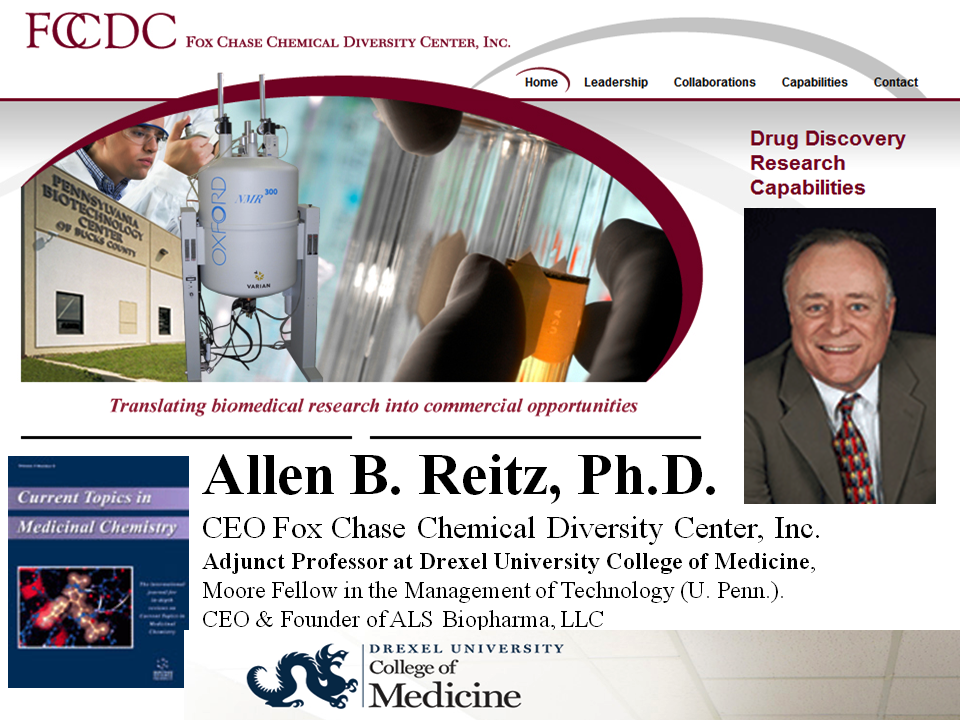 |
Co-Chairs (Theoretical Sciences)
Prof. D. BonchevDirector of Research on Bioinformatics, Center for the Study of Biological Complexity. Prof., Dept of Mathematics & Applied Mathematics, Virginia Commonwealth University (VCU), USA. . |
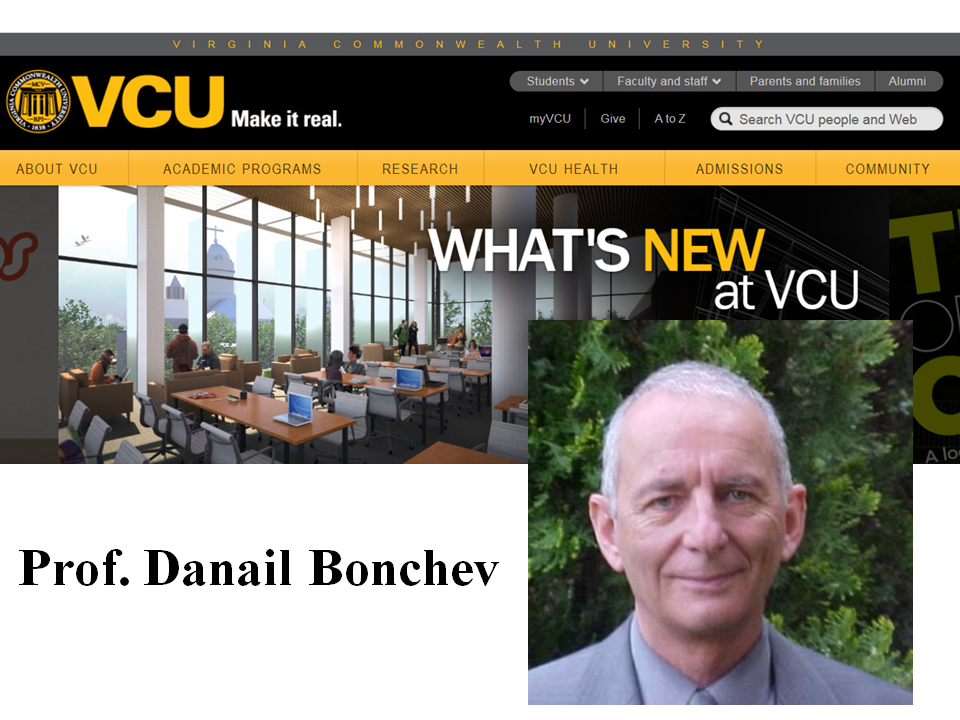 |
Dr. S.C. Basak,(1) Ph.D. Senior Scientist at Natural Resources Research Institute, Center for Water and the Environment (CWE), Duluth, MN, USA |
 |
Headquarters & Institutional Co-Chairs
Prof. F.P. CossíoProf. Department of Organic Chemistry I, University of Basque Country (UPV/EHU), Donostia - San Sebastián Campus, Gipuzkoa. |
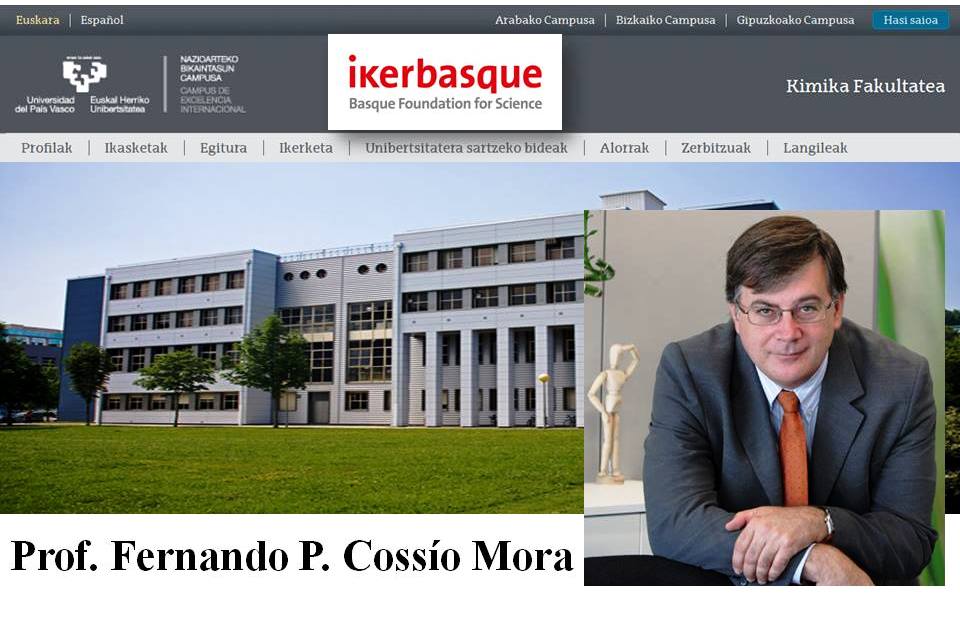 |
Prof. E. LeteProf. Department of Organic Chemistry II, University of Basque Country (UPV/EHU), Leioa, Sarriena w/n, Bizkaia. esther.lete@ehu.eus |
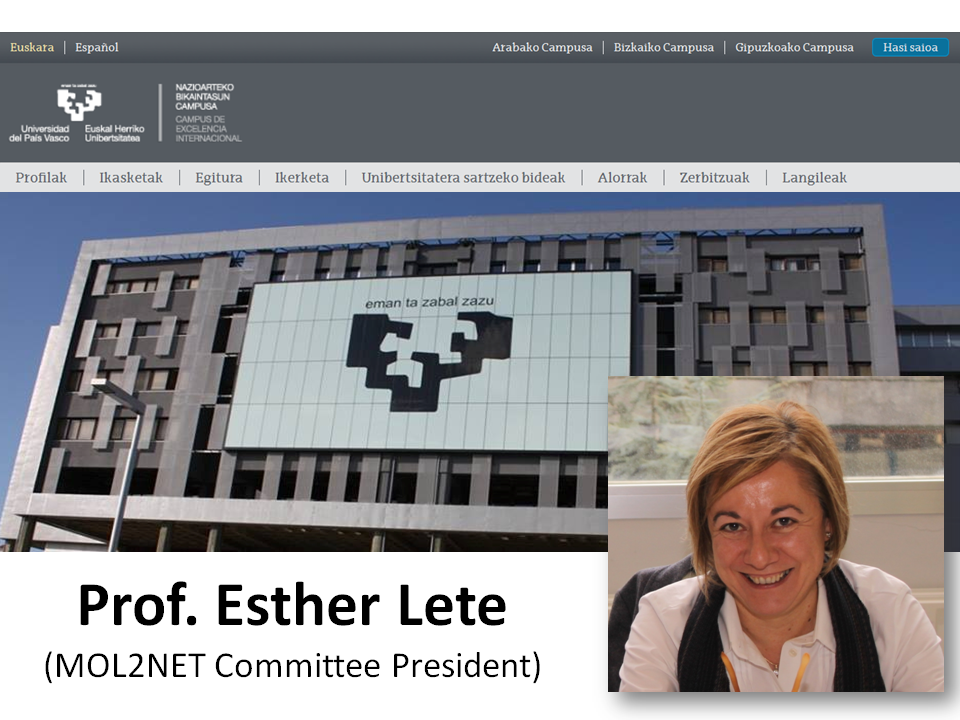 |
Prof. N. SotomayorDepartment of Organic Chemistry II, University of Basque Country (UPV/EHU), Leioa, Sarriena w/n, Bizkaia. nuria.sotomayor@ehu.es |
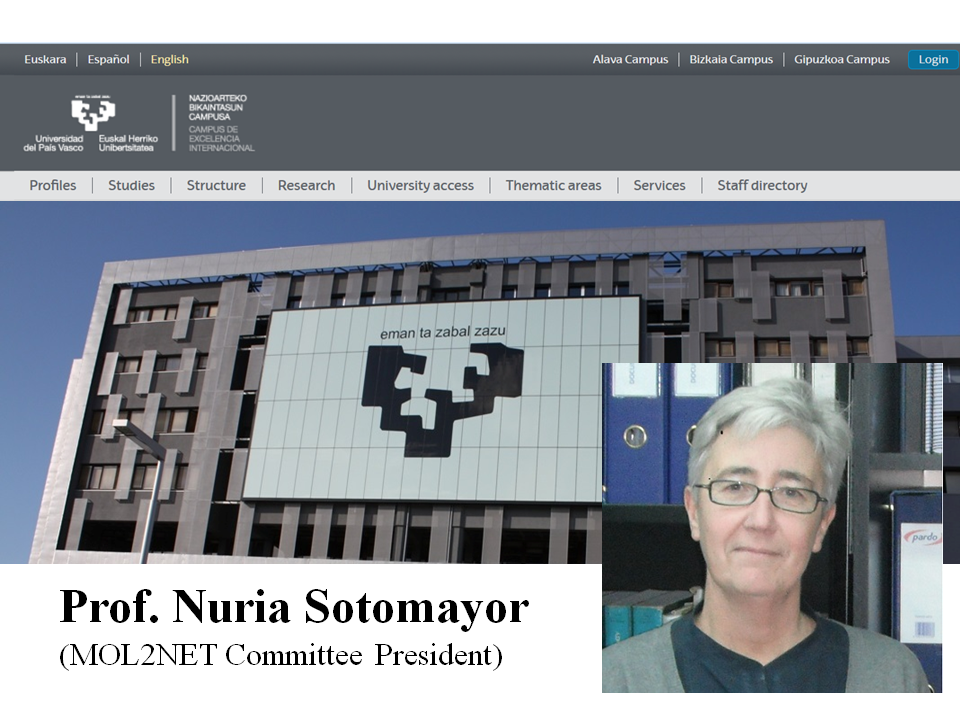 |
Prof. E. Domínguez PérezDepartment of Organic Chemistry II, University of Basque Country (UPV/EHU), Leioa, Sarriena w/n, Bizkaia. |
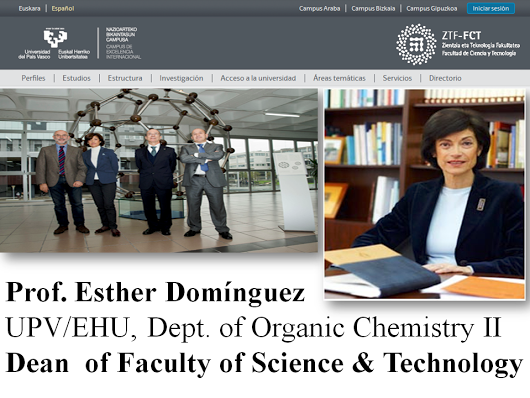 |
Prof. Claudio Palomo NicolauDirector Department of Organic Chemistry I, University of Basque Country (UPV/EHU), Donostia - San Sebastián Campus, Gipuzkoa. |
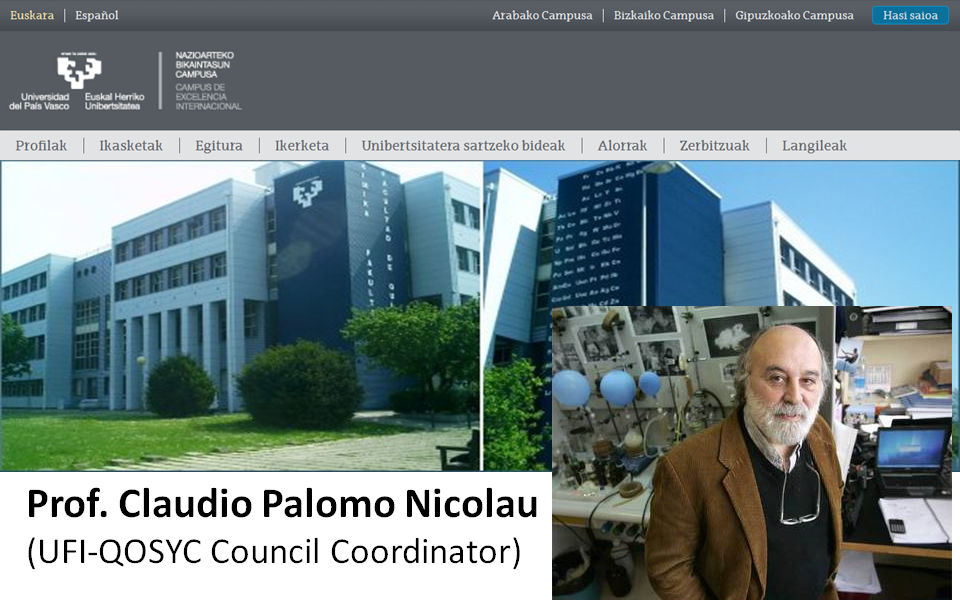 |
Thank you for your support!!!
MOL2NET Chairman
Prof. González-Díaz H., IKERBASQUE Professor, Email: gonzalezdiazh@yahoo.es
(1) Department of Organic Chemistry II, University of the Basque Country UPV/EHU , 48940, Leioa, Biscay, Spain.
(2) IKERBASQUE, Basque Foundation for Science , 48011, Bilbao, Biscay, Spain. ![]() ORCID: https://orcid.org/0000-0002-9392-2797
ORCID: https://orcid.org/0000-0002-9392-2797
JCR Journals Special Issues
Special Issues
Nanomaterials
The members of committees and/or authors are encouraged to edit special issues for different journals of the editorial MDPI (https://www.mdpi.com/). For this edition we have opened one special issue entitled: Experimental Nanosciences, Computational Chemistry, and Data Analysis. This special issue have been opened on the journal Nanomaterials (ISSN 2079-4991), JCR IF = 2.609. The special issue is now in call for papers, submissions are welcome in a posteriori, in parallel, or totally independently from the conference. Manuscripts should be submitted online at www.mdpi.com by registering and logging in to this website. Once you are registered, click here to go to the submission form. The guest-editors board of this special issue includes (to be updated):
International Journal of Molecular Sciences
See also, as example, the previous Special Issue on Data Analysis in Molecular Sciences. This issue was published in 2016 on the International Journal of Molecular Sciences (IJMS), IF = 3.257. The issue included 18 papers in total (some of them from the conference). In order to send a proposal of associated workshop and/or special issue contact the chairperson of the conference and UPV/EHU Ikerbasque Professor Prof. H. González-Díaz .
Workshops/Sections Schedule
MOL2NET Workshops/Sections Schedule
General Schedule
MOL2NET International Conference Series on Multidisciplinary Sciences, MDPI Sciforum, Basel, Switzerland has online sections (3) and workshops (>10) associated. The conference runs officially from Oct-05 to Dec-20 (of the year in course) at the online platform SciForum maintained by the editorial MDPI, Basel, Switzerland. However, the platform is open from Feb-15 to Dec-20 of the year in course for practical reasons; e.g., accommodation of many workshops in different dates along the year, reception of communications, etc.
Schedule for Submission and Publication of communications
As we mentioned before, despite the official dates the online sections (1-3) open at the beginning of the year in course (Feb-15) and are open all the year for submissions of communications in order to enable the accommodation of all workshops in different dates along the year. The associated workshops open in different dates along the year (see specific workshop pages). Submission of papers to all sections/workshops is open until Dec-15 of the year in course (2017 for present edition). The publication of communications is continuous all the year upon acceptance.
Schedule for Online participation
After publication of papers is closed we open the online platform from Dec-15 to Dec-20 of the year in course (2017 for present edition) for online participation. The authors will be able to post online comments and/or answers to comments in this workshop/section and also in the other general sections and/or >10 international workshops of the MOL2NET conference (many of them also run both online and in person). The participants are entitled to receive participation certificates for MOL2NET conference and all the workshops they participate upon request to the respective chairpersons. See committees of MOL2NET and each workshop.
Schedule for in person participation
Many of the workshops associated to MOL2NET are going to be held also in person (face-to-face) in different universities of USA, Spain, Italy, Mexico, Chile, etc. This in person workshops have specific schedules in parallel to their online versions. Please, go to the homepages of these workshops and/or contact their chairpersons for further details.
Notes on Topics
However, papers focused on the following topics are in general outside of the scope of the conference and the associated workshops. See the following list of topics outside the scope of the conference and associated workshops:
- Astronomy, Cosmology, etc. (due to lack of expertise of the committee)
- Quantum physics of elemental particles (due to lack of expertise of the committee)
- Physical and biological properties emerging after vigorous shaking of highly diluted systems.
About This Conference
MOL2NET is an International Conference Series to Foster Interdisciplinary Collaborations in Sciences with emphasis on Experimental Chemistry (all branches), Materials Science, Nanotechnology, Life Sciences, Medicine, and Healthcare, along with Data Analysis, Computer Sciences, Bioinformatics, Systems Biology, and Complex Networks Sciences.
Thank you for your support!!!
MOL2NET Chairman
Prof. González-Díaz H., IKERBASQUE Professor, Email: gonzalezdiazh@yahoo.es
(1) Department of Organic Chemistry II, University of the Basque Country UPV/EHU , 48940, Leioa, Biscay, Spain.
(2) IKERBASQUE, Basque Foundation for Science , 48011, Bilbao, Biscay, Spain. ![]() ORCID: https://orcid.org/0000-0002-9392-2797
ORCID: https://orcid.org/0000-0002-9392-2797
IKERBASQUE Committee
MOL2NET-IKERBASQUE Committee
Note: In this section we list Professors related to IKERBASQUE, Basque Foundation for Science who are members / supporters of some MOL2NET conference committee.
Honor Committee
Prof. Fernando P. Cossío, Ikerbasque President, Department of Organic Chemistry I, UPV/EHU, Gipuzkoa Campus
Prof. Jesús Jimenez Barbero, Ikerbasque Professor, Scientific Director of Center CICBiogune, Biscay
Prof. Luis M Liz-Marzán, Ikerbasque Professor, Scientific Director of Center CICbiomaGUNE, Gipuzkoa
Scientific Committee
Prof. Shira Knafo, Ikerbasque Professor, CSIC-UPV/EHU Biophysics Institute
Prof. Marcos J. Araúzo-Bravo, Ikerbasque Professor, Bioengineering, BioDonostia Health Research Institute
Prof. Nicola Abrescia, Ikerbasque Professor, CIC bioGUNE, Center for Cooperative Research in Biosciences
Prof. Mario Piris, Ikerbasque Prof., Donostia International Physics Center (DIPC), UPV/EHU, Campus Gipuzkoa
MOL2NET Chairman
Prof. González-Díaz H., IKERBASQUE Professor, Email: mol2net.chair@gmail.com
(1) Department of Organic Chemistry II, University of the Basque Country UPV/EHU , 48940, Leioa, Biscay, Spain.
(2) IKERBASQUE, Basque Foundation for Science , 48011, Bilbao, Biscay, Spain. ![]() ORCID: https://orcid.org/0000-0002-9392-2797
ORCID: https://orcid.org/0000-0002-9392-2797
00. Editorial & Proceedings Book
[Homepage] [Honor Committee] [Steering Committee] [Scientific Committee (Abroad)] [Scientific Committee (Local)]
We are glad to invite all colleagues worldwide to participate on a new edition of this International Conference Series. The official title of this conference series is MOL2NET International Conference Series on Multidisciplinary Sciences. MOL2NET (the conference running title) is the acronym of the lemma of the conference: From Molecules to Networks. This running title is inspired by the possibility of multidisciplinary collaborations in science. The topics of interest include, but are not limited to, Chemistry (All areas), Mathematics (Applied), Physics (Applied), Materials Science, Nanotechnology, Biology and Life Sciences (All areas), Medicine, Biomedical Engineering, Education, along with Computer Sciences, Data Analysis, Statistics, Artificial Intelligence, Deep Learning, Bioinformatics, Systems Biology, and Complex Networks Sciences. See the following note to authors on topics outside the scope of the conference and associated workshops [Note on topics].
The Scientific Headquarters (HQs) of this conference series are in the Faculty of Science and Technology, University of Basque Country (UPV/EHU), Biscay. However, the idea of this multidisciplinary conference emerged from the melting pot formed as the result of multiple collaborations of professors from many centers worldwide.
Locally, the founders and strongest supporters of the conference are professors endowed by IKERBASQUE, Basque Foundation for Sciences, professors from the two departments Department of Organic Chemistry I and Department of Organic Chemistry II of the University of Basque Country (UPV/EHU), and professors from the Department of Computer Sciences of the University of Coruña (UDC).
In addition, professors / researchers from the Center for the Study of Biological Complexity of the Virginia Commonwealth University (VCU), USA, the Natural Resources Research Institute, of the University of Minnesota, USA, and many other institutions are also founders and supporters of this conference, please see full committees lists.
THANK YOU FOR YOUR SUPPORT!!!
Sincerely yours
MOL2NET Chairman
Prof. González-Díaz H., IKERBASQUE Professor, Email: mol2net.chair@gmail.com
(1) Department of Organic Chemistry II, University of the Basque Country UPV/EHU , 48940, Leioa, Biscay, Spain.
(2) IKERBASQUE, Basque Foundation for Science , 48011, Bilbao, Biscay, Spain. ![]() ORCID: https://orcid.org/0000-0002-9392-2797
ORCID: https://orcid.org/0000-0002-9392-2797
MOL2NET Sponsors
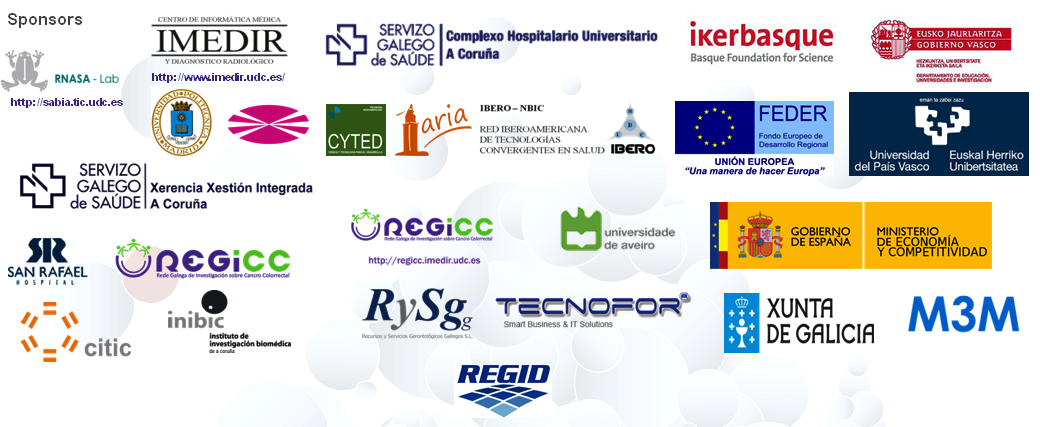
Show all published submissions (1) Hide published submissions (1)
Submissions
List of Papers (1) Toggle list
01. CHEMBIOINFO-03: Chem-Bioinformatics Congress Cambridge, UK-Chapel Hill and Richmond, USA, 2017
[MOL2NET 2015] [MOL2NET 2016] [MOL2NET 2017] [FACEBOOK (>10K followers)]
[Welcome Videos] [官话] [हिन्दी] [Euskera] [Castellano] [Português] [Français]
CHEMBIOINFO Associated Workshops

About. MOL2NET is the online host and publisher of the works presented at The Meeting of Young Investigators of Computational Structural Biology (EJIBCE) aims to bring together the Portuguese scientific community in this area in a meeting free of charge, in order to provide a space for discussion and sharing without commitments. See the details of the present and previous editions, committee, participants, speakers, etc., in the homepage [EJIBCE Editions].
Mission & Objectives. The sharing and discussion of ideas are the seeds of a strong scientific community. Given the current pandemic situation, it becomes increasingly necessary to boost and stimulate a spirit of openness and collaboration between the various research groups in Portugal. Among other factors, this panorama has shown the contribution and growing need for researchers capable of making the most of computational resources to generate quick, effective and rational responses to real, urgent and unavoidable problems.
This contact with Portugal becomes important when returning to the country after a doctoral, post-doctoral, or any other prolonged period abroad. On the other hand, there are those who want to stay abroad but at the same time cultivate a close relationship with science in Portugal. But, which groups exist in the area of Computational Structural Biology in Portugal? And what research is carried out in these groups? Questions arise naturally and the answers are not always simple to find. This initiative aims to answer some of these questions. It intends to make known what is best done in the area of Computational Structural Biology in Portugal, and on the other hand, to make known what Portuguese researchers living abroad are studying. In this way, we want to provide a space where projects and results can be disseminated and discussed, with a view to stimulating collaborations (nationally and internationally) and broadening the horizons of Computational Structural Biology in Portuguese.
Statement of responsibility. All material and services on this website are provided without any guarantee. The content published on these pages may contain errors for which the organization is not responsible. The content is also subject to periodic changes without prior notice. Any doubts and questions should be addressed to the organization by email (ejibce@gmail.com). Registering for this event implies acceptance of these conditions.
Acerca. O Encontro de Jovens Investigadores de Biologia Computacional Estrutural (EJIBCE) tem como objectivo reunir a comunidade científica portuguesa nesta área num encontro livre de encargos, de forma a proporcionar um espaço de discussão e partilha sem compromissos.
Missão & Objectivos. A partilha e discussão de ideias são as sementes para uma comunidade científica forte. Dada a presente situação pandémica, torna-se cada vez mais necessário dinamizar e estimular um espírito de abertura e colaboração entre os vários grupos de investigação em Portugal. Entre outros fatores, este panorama veio mostrar o contributo e crescente necessidade de investigadores capazes de rentabilizar os recursos computacionais para a geração de respostas rápidas, eficazes e racionais a problemas reais, urgentes e incotornáveis. Este contacto com Portugal torna-se importante no momento de voltar ao país após um doutoramento, um pós-doutoramento, ou qualquer outro período prolongado no estrangeiro. Por outro lado, há quem queira continuar no estrangeiro mas simultaneamente cultivar uma relação de proximidade com a ciência em Portugal. Mas, que grupos existem na área da Biologia Computacional Estrutural em Portugal? E que investigação é levada a cabo nesses grupos? As perguntas surgem naturalmente e as respostas nem sempre são simples de encontrar. Esta iniciativa pretende dar resposta a algumas destas perguntas. Pretende dar a conhecer o que de melhor se faz na área da Biologia Computacional Estrutural em Portugal, e por outro lado, dar a conhecer o que estudam investigadores portugueses radicados no estrangeiro. Desta forma, queremos proporcionar um espaço onde se possam divulgar e discutir projectos e resultados, com vista a estimular colaborações (a nível nacional e internacional) e a alargar os horizontes da Biologia Computacional Estrutural em Português.
Termo de Responsabilidade. Todo o material e serviços nesta página web são prestados sem qualquer garantia. O conteúdo publicado nestas páginas pode conter erros pelos quais a organização não se responsabiliza. O conteúdo está também sujeito a mudanças periódicas sem direito a pré-aviso. Quaisquer dúvidas e questões devem ser endereçadas à organização por correio electrónico (ejibce@gmail.com). O registo neste evento implica a aceitação destas condições.
CHEMXEDIT Workshop
CHEMBIOINFO-03 hosts this year the CHEMEDIT-03, Experimental Chemistry & Info. Tech., Bilbao, Spain-Paris, France-Miami, USA, 2017. This Inter-University workshop series is co-hosted by the Dept. of Chemistry and Biochemistry, Faculty of Sciences, University of Porto, Porto, Portugal; and the Dept. of Org. and Inorg. Chemistry, University of The Basque Country (UPV/EHU) and IKERBASQUE, Basque Foundation for Science (IKERBASQUE), Bilbao, Basque Country, Spain.
Topics of Interest. This workshop series promotes both experimental and theoretical research in Chemistry including, as well as chemical education, including but not limited to, Inorganic, Analytical, Physical, and Organic Chemistry. The topics are expected to be of wide scope. For instance, in experimental studies: Organic synthesis, Chemical reactivity, Catalysis, Solid State Chemistry, Inorganic Crystals, Crystal Symmetry, and Complexes. Physicochemistry and Analytical chemistry techniques; Spectroscopy (X-Ray, NMR, IR, EPR, Mass Spectroscopy), Chromatography and sample preparation techniques, TEM and SEM Microscopy. Also, in theoretical and computational studies: Computational Chemistry, Quantum Mechanics (Ab inition, DFT, MP3, AM1 methods), Monte Carlo (MC) algorithm, Quantitative Structure-Reactivity, Structure-Property, or Structure-Retention Relationships (QSPR/QSRR) models in organic, inorganic, physical and analytical chemistry. Chemometrics, Experimental Design, and Data Analysis in Analytical chemistry.
WCUCW Workshop
CHEMXEDIT is strongly tied to Chemistry Education as well. In consonance, this workshop also includes the WCUCW-02, West Coast University Capstone Workshop, Miami, FL, USA. This is the Capstone workshop for West Coast University (WCU), Miami, FL, USA. This workshop series held each academic term is devoted to fostering both education and research in multidisciplinary sciences. Nursing students completing their General Education courses at WCU form groups of three and take on the roles of scientist, medical researcher, or public health professional, all of them approaching an assigned topic from their field of expertise. They are each required to devise a study on their topic, pretend to conduct it, generate logical data to support a hypothesis, write an academic paper sharing their findings, and defend their data in a presentation.The workshop education goals focus on professors and students in the WCU Miami campus Capstone course. However, we also welcome researchers and students from other nationwide WCU campuses and researchers from other institutions around the world.
CHEMBIOINFO Honor Co-Host Chairpersons

Prof. Alexander Tropsha, Associated Dean UNC Eshelman School of Pharmacy, Associated Editor J. Chem. Info. Model., ACS, USA.
University of North Carolina , Chapel Hill , North Carolina 27599 , USA. Email: alex_tropsha@unc.edu Dr. Subhash C. Basak, Department of Chemistry and Biochemistry, University of Minnesota, Duluth, MN, USA.
Dr. Subhash C. Basak, Department of Chemistry and Biochemistry, University of Minnesota, Duluth, MN, USA.
 Dr. Yasset Perez-Riverol, European Bioinformatics Institute(EMBL-EBI), Cambridge, United Kingdom.
Dr. Yasset Perez-Riverol, European Bioinformatics Institute(EMBL-EBI), Cambridge, United Kingdom.
Prof. Dr. Irina Moreira, Center for Neuroscience and Cell Biology (CNC),University of Coimbra, Coimbra,Portugal.
MOL2NET Chairperson for Series Meeting of Young Researchers in Structural Computational Biology (EJIBCE ),
Emails: irina.moreira@cnc.uc.pt
 Prof. Humbert González-Díaz, IKERBASQUE Professor, Email: mol2net.chair@gmail.com, MOL2NET & USEDAT Founder Chairman
Prof. Humbert González-Díaz, IKERBASQUE Professor, Email: mol2net.chair@gmail.com, MOL2NET & USEDAT Founder Chairman
(1) Dept. of Organic Chemistry II, University of the Basque Country UPV/EHU , 48940, Leioa, Biscay, Spain.
(2) IKERBASQUE, Basque Foundation for Science , 48011, Bilbao, Biscay, Spain.
ORCID: https://orcid.org/0000-0002-9392-2797
CHEMXEDIT - WCUW Series Scientific Committee
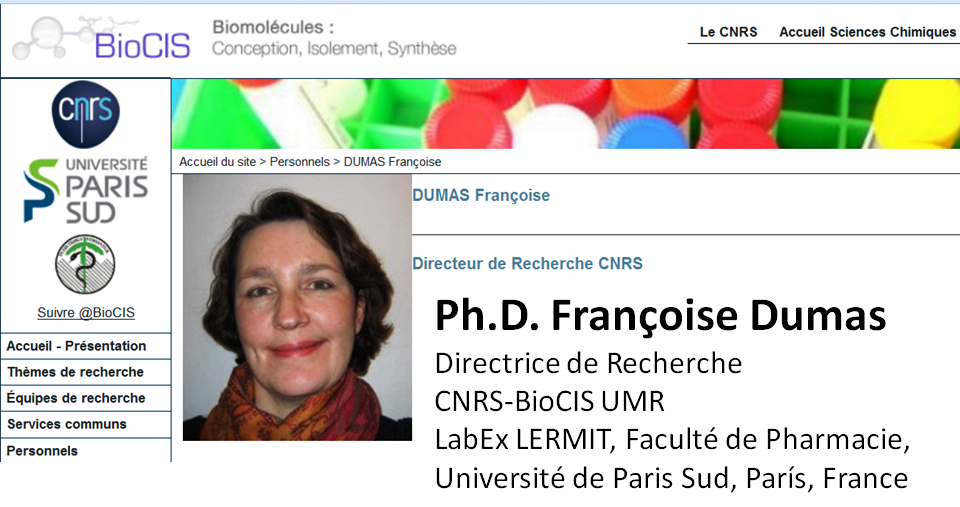
Prof. Françoise Dumas, CNRS, Directrice de Recherche, Prof. Université Paris-Saclay, Paris, France .

Prof. Maité Sylla, Assoc., Chimie Molécularie, Conservatoire National des Arts et Métiers CNAM, París, France.
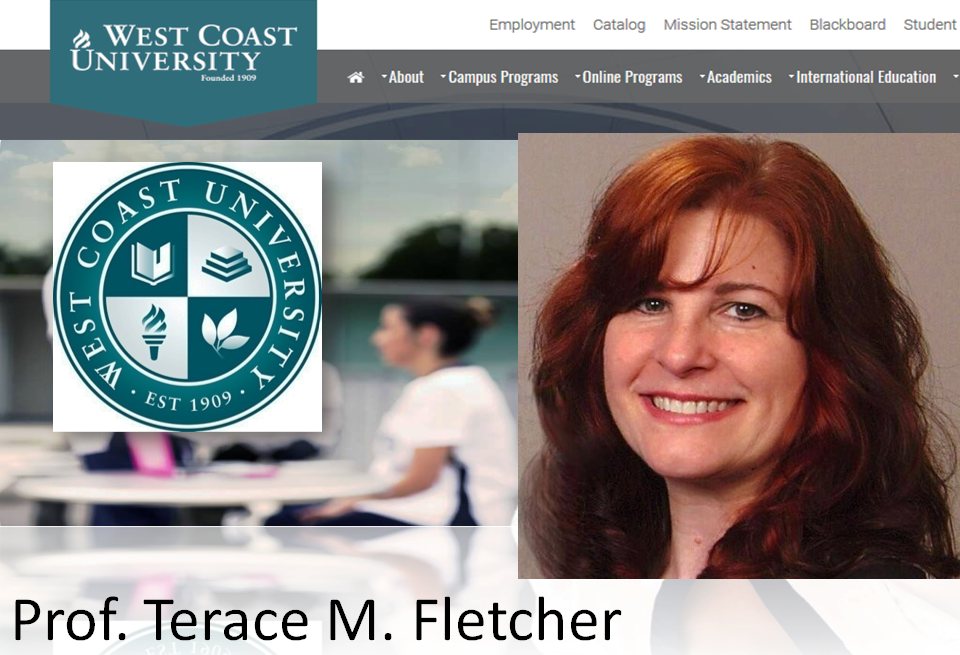
Prof. Terace Fletcher, PhD, MS, Email: teFletcher@westcoastuniversity.edu
Academic Dean and Professor, West Coast University, Miami Campus, FL, USA.


Prof. Nuria Sotomayor, Dept. Org. & Inorg. Chem., University of Basque Country (UPV/EHU), Basque Country, Spain.
Prof. Melissa Cueto, Email: meCueto@westcoastuniversity.edu
MAInstructor II, West Coast University, Miami, FL, USA
Adjunct Prof., University of Miami, Coral Gables, FL, USA.
Education Specialist, West Coast University, Miami Campus, FL, USA.
Prof. Lazaro Pino, Assoc. Prof., West Coast University (WCU), Miami, FL, USA.
Professor of Chemistry, San Ignacio University (SIU), Campus Miami, FL, USA.
Adjunct Professor, Miami Dade College (MDC), Miami, FL, USA.
Advisory Publication Chair
Prof. Humbert G. Díaz, IKERBASQUE Professor, Email: mol2net.chair@gmail.com
(1) Department of Organic Chemistry II and Basque Center for Biophysics, University of the Basque Country UPV/EHU , 48940, Leioa, Biscay, Basque Country, Spain. (2) IKERBASQUE, Basque Foundation for Science , 48011, Bilbao, Biscay, Basque Country, Spain.
ORCID: https://orcid.org/0000-0002-9392-2797
ICTs & Regulatory Affairs Chairperson
Dr. Aliuska Duardo-Sanchez (Law.Lic., Ph.D. TICs & Legal Sciences)
PANELFIT European Commission Project Manager. Research Group: Chair in Law and The Human Genome,
Dept. of Public Law, University of Basque Country (UPV/EHU), Campus Biscay, Leioa 48940, Spain.
Congress Chairs
Professor Esther Lete
Dr. Nuria Sotomayor
Professor Sonia Arrasate Gil
Show all published submissions (30) Hide published submissions (30)
Submissions
List of Papers (30) Toggle list
02. CHEMBIOMOL-03: Chem. Biol. & Med. Chem. Workshop, Rostock, Germany-Bilbao, Spain-Galveston, Texas, USA, 2017

Experimental Sciences Topics: CHEMBIOMOL series focus on experimental research on the frontiers of Biomolecular and Biomedical Sciences including: Organic Chemistry, Organic Synthesis, Medicinal Chemistry, Chemical Biology, Molecular Pharmacology, Toxicology, Biotechnology, Biomedical Engineering, Systems Biology, etc. This includes spectroscopic structural characterization (NMR, X-Ray, IR, MS, etc.), Organic synthesis, Biological Assays, Proteomics, Protein Structure, Biophysics, Genomics, Toxicity tests, etc.
Computational Sciences Topics: In addition, the workshop also deals with the application of new Information and Communication Technologies (ICTs) in the previous experimental areas. This includes, Chemoinformatics, Bioinformatics, Data Analysis, Statistics, Artificial Intelligence, Deep Learning, Programming, Databases, Complex Network Analysis of Biosystems, Complexity in Biosystems, Multiscale Systems, Chemical Computation, Theoretical Biology, etc.
Bioethics & Regulatory Topics: Last, not the least, the workshop deals with all the Legal, Regulatory, and Bioethics issues emerging from use of new experimental and ICTs in the previous areas such as Drug Patenting, Drug re-purposing patents, Proteome and Genome patentability, Synthetic Biology, Modified Organisms, Biomedical Personal Image Processing, Personal Data Protection, Personalized Medicine, Software and Models Copyrights, etc.
(5) Follow the link in the email or login to upload paper (doc and pdf format).
(6) Login to post comments, questions, or answers in a section or in one of the MOL2NET workshops.
 Prof. Jia Zhou, Department of Pharmacology and Toxicology, University of Texas Medical Branch, Galveston, TX, USA.
Prof. Jia Zhou, Department of Pharmacology and Toxicology, University of Texas Medical Branch, Galveston, TX, USA.
(EIC Current Topics in Medicinal Chemistry)
ERASMUS+ Co-Host Academic Pursuit Chairpersons


(Coordinator Ph.D. Synth. & Ind. Chemistry)

Prof. Nuria Sotomayor, Dept. Org. & Inorg. Chem., University of Basque Country (UPV/EHU), Basque Country, Spain.
Scientific Committee Members
Prof. Yagamare Fall, Dept. of Organic Chemistry, University of Vigo (UVIGO), Vigo, Spain.
Prof. Generosa Gómez, Dept. of Organic Chemistry, University of Vigo (UVIGO), Vigo, Spain.
ERASMUS+ UROSTOCK-UPVEHU Organic Chemistry Academic Agreement coordinator.
(1) Department of Organic Chemistry II and Basque Center for Biophysics (CSIC-UPV/EHU),
(2) IKERBASQUE, Basque Foundation for Science , 48011, Bilbao, Basque Country, Spain.
ICTs & Regulatory Affairs Chairperson
Dr. Aliuska Duardo-Sanchez (Law.Lic., Ph.D. TICs & Legal Sciences)
PANELFIT European Commission Project Manager. Research Group: Chair in Law and The Human Genome,
Dept. of Public Law, University of Basque Country (UPV/EHU), Campus Biscay, Leioa 48940, , Basque Country, Spain.
Show all published submissions (29) Hide published submissions (29)
Submissions
List of Papers (29) Toggle list
05. NANOBIOMAT-03: Nanotechnology & Biomaterials Sci. Congress, Jackson & Fargo, USA, 2017


Prof. Bakhtiyor Rasulev, President of MOL2NET Scientific Committee for Polymers & Materials Sciences.
Department of Coatings and Polymeric Material, North Dakota State University (NDSU), Fargo, USA.
Honor Chairperson

Prof. Jerzy Leszczynski, (USA Presidential Distinguished Fellow)
Director CREST NSF Interdisciplinary Center for Nanotoxicity (ICN),
Dept. of Chem. and Biochem., Jackson State University (JSU), USA.
Honor Scientific Committee
Prof. Juan M. Ruso, Department of Applied Physics,
Faculty of Physics, University of Santiago de Compostela (USC), Spain.
Prof. Natalia D.S. Cordeiro, Department of Chemistry and Biochemistry,
Faculty of Sciences, University of Porto, Porto, Portugal.
Assoc. Prof. Ricardo Grau-Crespo, Department of Chemistry,
University of Reading, Whiteknights, Reading, United Kingdom.
Prof. Juan M. Gutierrez-Zorrilla, Dir. Dept. of Inorganic Chemistry,
Faculty of Science and Technology, UPV/EHU, Campus Biscay, Basque Country, Spain.
Prof. Jose Luis Vilas, Dir. Dept. of Physical Chemistry,
Faculty of Science and Technology, UPV/EHU, Campus Biscay, Basque Country, Spain.
Prof. Luis Lezama, Department of Inorganic Chemistry,
Faculty of Science and Technology, UPV/EHU, Campus Biscay, Basque Country, Spain.
Prof. Alla Toropova, Laboratory of Environmental Chemistry and Toxicology,
Istituto di Ricerche Farmacologiche Mario Negri IRCCS, Milano, Italy.
Prof. Andrey Toropov, Laboratory of Environmental Chemistry and Toxicology,
Istituto di Ricerche Farmacologiche Mario Negri IRCCS, Milano, Italy.
Scientific Committee
Dr. Natalia Sizochenko, Department of Computer Science,
Dartmouth College, Hanover, NH, USA.
Dr. Guillermin Agüero, CIIMAR/CIMAR, Interdisciplinary Centre of Marine and
Environmental Research, University of Porto, Portugal.
Dr. Gerardo M. Casañola-Martin, Dept. of Coatings and Polymeric Materials,
North Dakota State University (NDSU), Fargo, USA.
Publication Advisory Chairman
Prof. González-Díaz H., IKERBASQUE Professor, Email: mol2net.chair@gmail.com
(1) Dept of Org. Chem. II and Basque Center for Biophysics (CSIC UPV/EHU),
University of the Basque Country UPV/EHU , 48940, Leioa, Biscay, Spain.
(2) IKERBASQUE, Basque Foundation for Science , 48011, Bilbao, Biscay, Spain.
ICTs, Bioethics & Regulatory Affairs Chairperson
Dr. Aliuska Duardo-Sanchez (Law.Lic., Ph.D. TICs & Legal Sciences)
Dept. of Public Law, University of Basque Country (UPV/EHU), Campus Biscay, Leioa 48940, Spain.
Show all published submissions (14) Hide published submissions (14)
Submissions
List of Papers (14) Toggle list
06. NICEXSM-03: North-Ibero-American Congress on Exp. & Simul. Methods, Valencia, Bilbao, Spain-Paraiba, Brasil-Miami, USA, 2017

Welcome Message
We are glad to invite all colleagues worldwide to participate on a new edition of the workshop NIXMSM-05: North-Ibero-American Workshop on EXperimental, Modelling, and Simulation Methods, Valencia, Bilbao, Spain - Miami, USA, 2021. The workshop publish totally free of charge communications in multidisciplinary sciences involving experimental and/or computational methods. The field of application include, but are not limited to, Biomolecular, Biomedical, Materials, Environmental, Trade, Learning, Education, and Social sciences in general (see scope section). This is an inter-university transatlantic joint workshop co-chaired by USA and Europe institutions. In first instance, the founder chairs are professors of the Institute of Molecular Science (ICMol), University of Valencia (UV), and the Catholic University of Valencia (UCV), Valencia, Spain. From the America's side the workshop is co-hosted by professors of Department of Mathematics Miami Dade College (MDC) and Department of Chemistry and Biomolecular Engineering, Tulane University (TULANE), New Orleans, USA.
More recently, the workshop is being co-hosted by researchers of the Basque Center for Biophysics (BIOFISKA), Basque Country, Spain. In this sense, from this year the workshop is also publishing the covers and links to talks presented on the JournalCLubBiofisika. This is an experts panel celebrated in the previous center and running both in-person and on-line. This journal club is focused on the exposition by a panelist and posterior brain-storming discussion of previous papers published by different authors worldwide.
All in all, the workshop is associated to the MOL2NET International Conference Series on Multidisciplinary Sciences. MOL2NET (From Molecules to Networks) series is running this year MOL2NET-2020, International Conference on Multidisciplinary Sciences, ISSN: 2624-5078, MDPI SciForum, Basel, Switzerland, 2020. Consequently, it is co-chaired and promoted as well by researchers of the University of The Basque Country (UPV/EHU) and IKERBASQUE, Basque Foundation for Science, Bilbao, Basque Country.
Working Languages
English is the main working language of the workshop. However, as a North-Ibero-American inclusive conference the workshop aims to accept papers to be published in multiple languages spoken on the countries, states, and communities of the entire North-Ibero-American area of influence. It involve, but is not limited to: México, Brazil, Spain, Portugal, USA, Canada, Chile, Ecuador, Basque Country, Catalunya, Valencia, Galicia, etc. Consequently, we accept papers on the following languages: English, Spanish, Portuguese, French, Basque (Euskera), Catalá / Valenciano, and Galego. We also accept bi-lingual posters in two-column format, e.g, English-Basque, English-Spanish, English-Portuguese, Spanish-Galego, etc.
Scope and Target Audience
Last, not the least, the workshop deals with all the Legal, Regulatory, and Bioethics issues emerging from the use of both experimental and modelling and simulation methods in the previous areas. This include, Drug, Gene, Protein, Vaccine, Biomarkers, and Biomaterials patentability, Personalized Medicine and Personal Data Protection, Cybersecurity, Cryptocurrency Mining, Data Protection in Personal Image Processing, Software and Models Copyrights, etc.
Before to submit your communication we strongly recommend to read carefully the [Notes to Authors] about, participation modalities, publication model, copyright, authors responsibilities, etc.
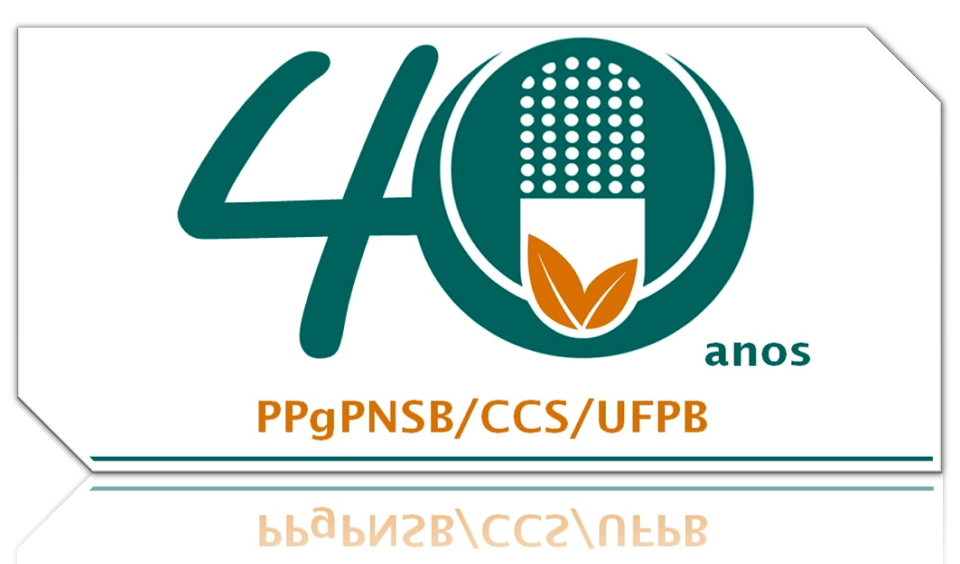
NIXMSM-03 publish the work presented at WRSAMC-02: Workshop in Medicinal Chemistry, UFPB, Paraiba, Brasil, 2017 organized by researches from Department of Chemistry, Programa de Pós-Graduação em Produtos Naturais e Sintéticos Bioativos (PgPNSB - Postgraduate Program in Natural Products and Synthetic Bioactive) and Hospital Universitário of Universidade Federal da Paraíba (UFPB). This year the WRSAMC is dedicate to the PgPNSB 40th Anniversary.
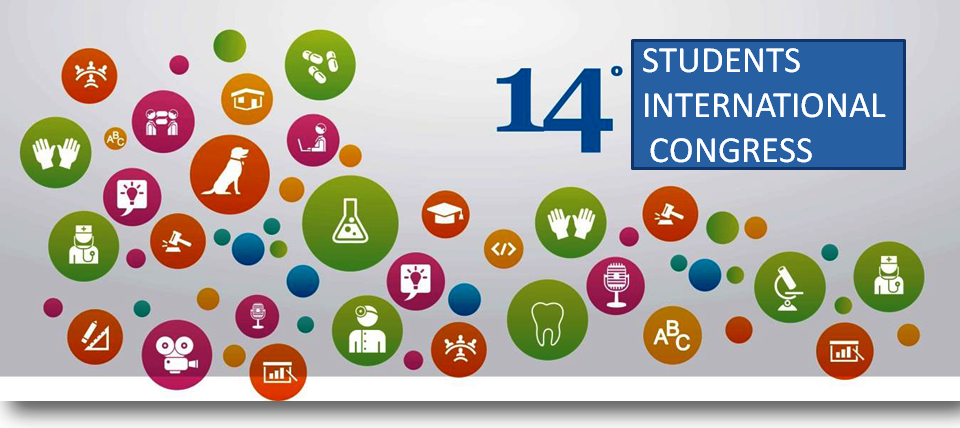
NIXMSM-03 is going to publish the works presented at WUCH01: UCH Workshop Series on Multidisciplinary Sciences, Valencia, Spain, 1st edition. This is one scientific conference series for professors, researchers, and young scientists; with special emphasis on the active participation of graduated students of the CEU Cardinal Herrera University (UCH), Valencia, Spain. The main source of papers of this workshop are the results presented by the professors and students of the UCH on their 14th Students International Congress. This congress was hold in person on July 2016 at UCH, Montcada, Valencia, Spain.

NXIMSM-01 also publish the works presented on the UPVEHUDW01: First UPV-EHU DELFIN Program Workshop, Bilbao, Jul, 2017 is a scientific and educational workshop organized by professors of the University of the Basque Country (UPV/EHU) and IKERBASQUE, Basque Foundation for Sciences. The workshops is associated to the MOL2NET International Conference Series on Multidisciplinary Sciences, MDPI Sciforum, Basel, Switzerland. The workshop aim is to promote the scientific, educational, and cultural interchange of professors and students of UPV/EHU with students of the international education network DELFIN, Mexico. The DELFIN program was created in 1995 with the aim of strengthening the collaborative culture between the Higher Education Institutions and Research Centers that are members of the Program, through the mobility of professors-researchers, students and the dissemination of scientific and technological products. In particular to strengthen the development of research and national graduate. Specifically, student mobility is promoted through academic research stays, within the framework of the Summer of Scientific and Technological Research of the Pacific. This mobility program strengthens the vocation of young people for science and technology and influences their decision to join postgraduate programs at home and abroad.
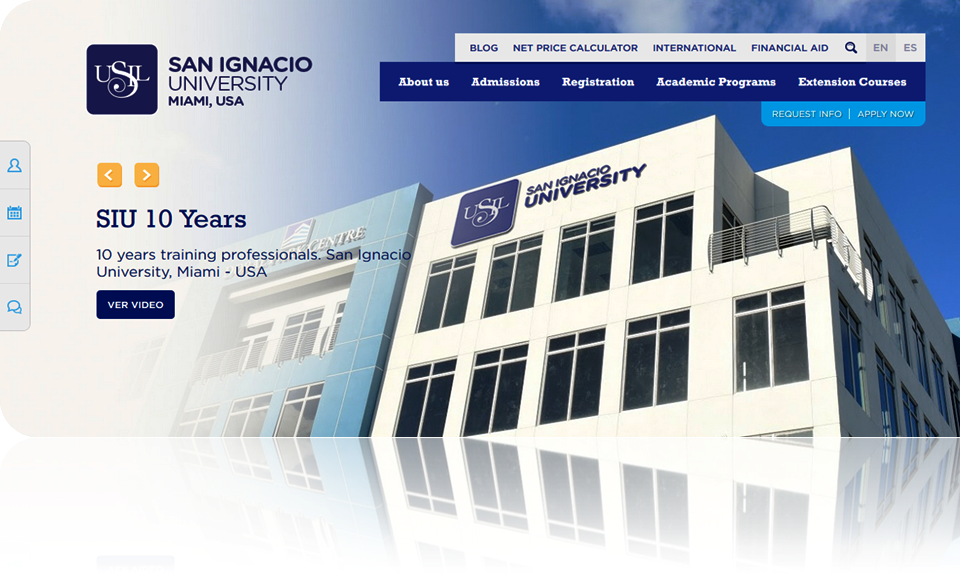
NIXMSM-03 is the host of the workshop SIUSCI-01. SIUSCI-01 workshop series will be held at San Ignacio University (SIU), FL, Miami, USA. San Ignacio University is an innovative educational institution dedicated to the creation of the leaders of tomorrow accredited by the Accrediting Council for Independent Colleges and Schools (ACICS). The present workshop focus on topics of multidisciplinary sciences relevant to the interests of SIU students and professors. SIUSCI-01 is also devoted to strength the collaborations and networking between SIU professors and students with other students and researchers in FL education system and worldwide.
Abstract preparation and submission
We strongly recommend you to read carefully the notes to participants at the following page [Instructions to authors] about publication model, copyright, authors responsibilities, etc. Submit your communications in two steps, first submit your title, authors, and abstract. Next, upload your communication after abstract approval.
Steps for Participation
(0) Register, Sign in/Login, to Sciforum platform [Sciforum login] (All the year)
(1) Submit the title and abstract, select a section or workshop (do not upload paper here) [Submit New Abstract] (until Dec-15)
(2) Wait for Sciforum abstract acceptance email, follow the link, and/or login to upload paper, doc and pdf format (until Dec-15)
(3) Download template doc and prepare your communication [IWIMSM Template File.doc] (until Dec-15)
(4) Wait for paper acceptance and publication emails (follow link to proofread your paper) (Asap after upload)
(5) Communicate with chairpersons if corrections are necessary, including past editions (All the year)
(6) Log in to post comments, questions, or answers in a section or one of the workshops (Dec-15 to Dec-20)
(7) Contact chairpersons if you need author (publication) or attendance (posting) certificate for conference and/or workshops (All the year)
Honor Scientific Committee (Chairpersons)
Prof. Gloria Castellano, Email: gloria.castellano@ucv.es
Director of Department of Experimental Sciences and Mathematics,
Catholic University of Valencia (UCV), Valencia, Spain.
Editor of NEREIS, ISSN: 1888-8550, Revista Iberoamericana
Interdisciplinar de Métodos, Modelización y Simulación
Prof. Francisco Torrens, Email: Francisco.Torrens@uv.es
Institute of Molecular Science (ICMol),
University of Valencia (UV), Valencia, Spain.
Prof. David Quesada, Email: dquesada@mdc.edu
Director of Dept. of Mathematics, Miami Dade Colege (MDC), Miami, FL, USA.
Prof. Marcus Tullius Scotti, Emails: mtscotti@gmail.com, mscotti@ccae.ufpb.br
Departamento de Química, Centro de Ciências Exatas e da Natureza,
Universidade Federal da Paraíba - Campus I, João Pessoa, Paraíba, Brasil.
Prof. Jose L Medina-Franco,
National Autonomous University of Mexico (UNAM), México.
Prof. María Auxiliadora Dea Ayuela, Email: mdea@uchceu.es
CEU Cardenal Herrera University, Moncada, Valencia, Spain.
SIUSCI committee
Prof. Lazaro Pino, Email: lazaropino@sanignaciouniversity.edu
San Ignacio University (SIU), Campus Miami, FL, Miami, USA.
Prof. Maykel Cruz Monteagudo, Consultant, Univ. of Miami, Prof. West Coast University, FL, USA.
Prof. Xiomara Cabrera, San Ignacio University (SIU), Campus Miami, FL, Miami, USA.
Prof. Tania Sureda, Miami Dade College (MDC), Miami, FL, USA.
WRSAMC-02 Scientific Committee
Prof. Luciana Scotti, (WRSAMC-02 Committee Presedient), Emails: luciana.scotti@gmail.com
Hospital Universitário, Universidade Federal da Paraíba - Campus I, João Pessoa, Paraíba, Brasil.
Prof. Francisco Jaime Bezerra Mendonça Junior, Universidade Federal da Paraíba - Campus I, João Pessoa, Paraíba, Brasil.
Prof. JoseanFechine Tavares, Universidade Federal da Paraíba - Campus I, João Pessoa, Paraíba, Brasil.
Prof. Fabiana de Andrade Cavalcante Oliveira, Universidade Federal da Paraíba - Campus I, João Pessoa, Paraíba, Brasil.
Prof. BagnoliaAraujo Costa, Universidade Federal da Paraíba - Campus I, João Pessoa, Paraíba, Brasil.
Prof. Mateus Feitosa Alves, Universidade Federal da Paraíba - Campus I, João Pessoa, Paraíba, Brasil.
Prof. Vicente Carlos de Oliveira Costa, Universidade Federal da Paraíba - Campus I, João Pessoa, Paraíba, Brasil.
M.Sc. Lucas Silva Abreu, Universidade Federal da Paraíba - Campus I, João Pessoa, Paraíba, Brasil.
M.Sc. Yuri Mangueira Do Nascimento, Universidade Federal da Paraíba - Campus I, João Pessoa, Paraíba, Brasil.
NIXMSM-03 Scientific Committee
Prof. Gloria Castellano, Dir. Dept. of Exp. Sci. and Math., Catholic University of Valencia (UCV), Valencia, Spain.
Prof. Francisco Torrens, Inst. of Molecular Science (ICMol), Univ. of Valencia (UV), Valencia, Spain.
Prof. James Robert Green, Dept. of Systems and Comput. Eng., Carleton University, Canada.
Prof. Jorge Gálvez, Dept. of Physical Chemistry, Faculty of Pharmacy, University of Valencia, Spain.
Prof. Ramon García-Domenech, Dept. of Physical Chemistry, Faculty of Pharmacy, University of Valencia, Spain.
Prof. Oscar M. Rivera Borroto, Mathematics, Houston Community College, Houston, TX, USA.
Prof. Natalia D.S. Cordeiro, Department of Chemistry and Biochemistry, University of Porto, Porto, Portugal.
Prof. Enrique Onieva, DEUSTOTECH Institute, University of Deusto, Bilbao, Spain.
Prof. Carlos Velazquez Martinez, Faculty of Pharmacy & Pharmaceutical Sciences, University of Alberta, Canada.
Prof. Facundo Pérez Giménez, Department of Physical Chemistry, Faculty of Pharmacy, University of Valencia, Spain.
Dr. Carlos Polanco González, Dept. of Mathematics, Universidad Nacional Autonoma de México (UNAM), México.
Prof. Jesus V. De Julián Ortiz, Department of Physical Chemistry, University of Valencia, Spain.
Dr. Guillermin Agüero, CIIMAR/CIMAR, University of Porto, Portugal.
Dr. Maria Galvez-Llompart, Department of Physical Chemistry, Faculty of Pharmacy, University of Valencia, Spain.
Dr. Riccardo Zanni, Department of Physical Chemistry, Faculty of Pharmacy, University of Valencia, Spain.
Prof. Alejandro Pazos, Ph.D., M.D., Director of Department of Computation, University of Coruña (UDC), Coruña, Spain.
Prof. Cristian R. Munteanu, Department of Computation, University of Coruña (UDC), A Coruña, Spain.
Prof. Juan M. Ruso, Dept. of Applied Physics, University of Santiago de Compostela (USC), Spain.
Dr. Jose Correa Basurto, Escuela Superior de Medicina, IPN, México.
Prof. Aleksey E. Kuznetsov, Universidad Técnica Federico Santa María, Santiago, Chile.
PhD. Gisselle Pérez-Machado, EPIDISEASE S.L. CIBERER, Valencia, Spain.
Prof. Carolina Horta Andrade, Universidade Federal de Goias, Setor Leste Universitario, Goiania, Brazil.
Prof. Yovani Marrero-Ponce, University San Francisco de Quito, Cumbayá, Quito, Ecuador.
Dr. Guillermin Agüero, CIIMAR, Interdisc. Centre of Marine and Environ. Research, Univ. of Porto, Portugal.
Prof. Eduardo Tejera, Bio-Cheminformatics, Universidad de Las Americas (UDLA), Quito, Ecuador.
Dr. Fabien Plisson. CINVESTAV- UGA-LAENGEBIO Mexico.
EHUDW-01 Scientific Committee
Prof. Dr. Susana Serrano Gazteluurrutia, Email: suserrano.gazteluurrutia@ehu.eus
Department of Public Law, Faculty of Law, University of the Basque Country UPV/EHU, Campus Biscay
Prof. Dr. Guillermo Quindós, Email: guillermo.quindos@ehu.eus,
Department of Immunology, Microbiology, and Parasitology,
University of the Basque Country UPV/EHU, Campus Biscay
Prof. Dr. Elena Eraso Barrio, Email: elena.eraso@ehu.eus,
Department of Immunology, Microbiology, and Parasitology,
University of the Basque Country UPV/EHU, Campus Biscay
Prof. Dr. Sonia Arrasate, Email: sonia.arrazate@ehu.eus
Department of Organic Chemistry II, University of Basque Country (UPV/EHU), Campus Biscay
NIXMSM-01 Honor Advisory Chairman
Prof. Humberto González-Díaz H., IKERBASQUE Professor, Email: mol2net.chair@gmail.com
(1) Department of Organic and Inorganic Chemistry and Basque Centre for Biophysics,
University of the Basque Country UPV/EHU , 48940, Leioa, Biscay, Spain.
(2) IKERBASQUE, Basque Foundation for Science , 48011, Bilbao, Biscay, Spain.
NIXMSM-01 ICTs & Regulatory Affairs Chairperson
Dr. Aliuska Duardo-Sanchez (Law.Lic., Ph.D. TICs & Legal Sciences),
Chair in Law & The Human Genome Research Group, Faculty of Law,
University of The Basque Country UPV/EHU, Leioa (Bilbao), Biscay,
PANELFIT H2020, Project Manager & EDC Board Coordinator, Europe Commission.
Congress Chairs
Dr. Gloria Castellano
Professor Francisco Torrens
Show all published submissions (21) Hide published submissions (21)
Submissions
List of Papers (21) Toggle list
08. TECHLAWSCI-01: PANELFIT & NKL H2020 Tech. Law. & Sci. Challenges, Bilbao, Spain, Halden, Norway, Baltimore, USA, 2017
MOL2NET2017, LAWSCI01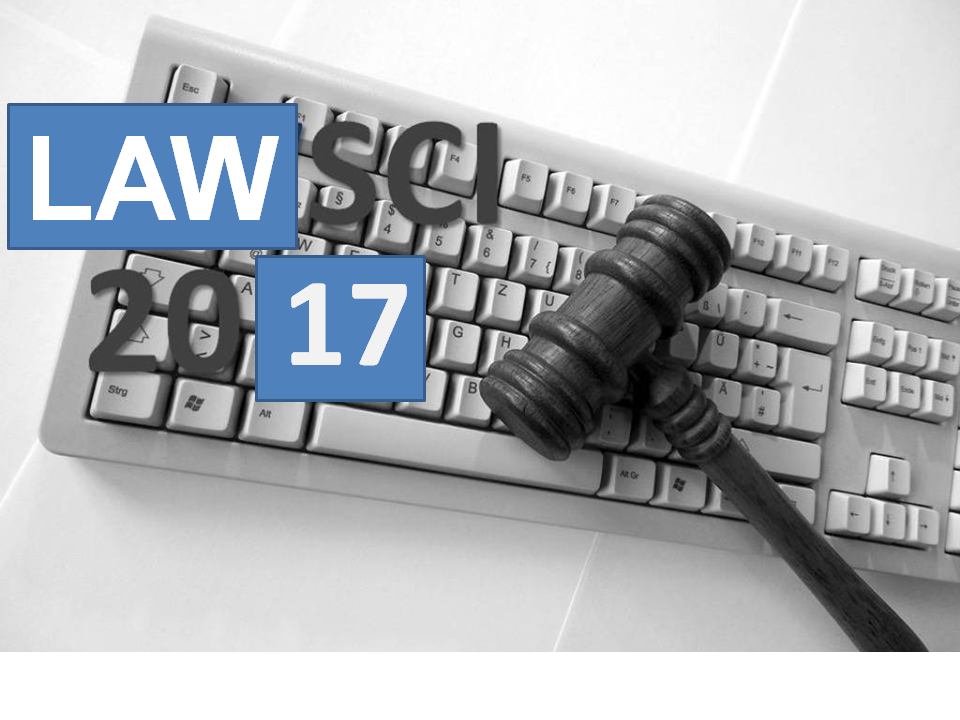
[SUBMIT HERE] (Select MOL2NET Conference, Section LAWSci)
Dear colleagues worldwide,
We are glad to invite you to participate in the workshop TECHLAWSCI-01: PANELFIT & NKL H2020 Tech. Law. & Sci. Challenges, Bilbao, Spain, Halden, Norway, Baltimore, USA, 2017. This workshop will be held from 25-30 Oct, 2017, online at Sciforum platform. This is a workshop associated to the MOL2NET International Conference Series on Multidisciplinary Sciences, MDPI Sciforum, Switzerland, HQ UPV/EHU, Bilbao, Biscay, Spain.
LAWSci workshop series promotes multidisciplinary collaborations and debate in the frontiers of Law, Technology, Life, and Social Sciences. The interaction between bio-science and ICTs has forged great developments in many fields. However, the appreciation of these discoveries is sadly, all too often, accompanied by a lack of understanding of the legal implications. This conference series aims to provide a reference to the various legal avenues that are available for the protection of scientific advances, but also the legal instruments to protect society from unwanted effects. It constitutes a study of some of the legal implications of bioscience and ICT advances, weighing their impact on society and the law's role in shaping that effect.
In this sense, the presentations will be focused on legal trends in different fields covering, but not limited to: patentability in plants and human genomics, clinical procedures’ standards, patients’ personal data protection, informed consent, regulatory issues in drug discovery, biomedical research legislation, toxicology, medico-legal problems such as healthcare malpractice, medical insurance or ethics in medical practice, software protection in chemo-informatics, bioinformatics, medical informatics, and social sciences, taxes in the biotechnology industry and causality/liability in environmental pollution, criminology, etc. The conference will run on-line and free, saving traveling and participation costs (subscriptions, open publication, participation in forum, certificates, etc., are free of cost).
Publication Model and Authors Responsibility:
Before to submit your work be aware that the editorial process is the same than for a PREPRINT service. Therefore, all works receive doi number and are indexed in databases (GoogleScholar, Publons, etc.). However, the works published here are preliminary communications and not post-print journal papers. In this sense, committee and/or external reviewers check only scope and apparent scientific soundness. The works may receive also comments from registered participants (public post-publication review). The authors are encouraged to submit their works to a peer-reviewed scientific journals of MDPI or other editorials during or after finalization of the conference, as per SciForum copyright rules.
In any case, it is the responsibility of the authors, to ensure the veracity of the contents, checking similarity to other works, and carry out a proper citation of previous works. The committee is not responsible of this previous aspects in this publishing modality. In this sense, we strongly recommend the authors to use online text-similarity checking services to avoid any form of plagiarism or copyright violation. Some workshops in this conference series use specialized services to checked for possible text similarity. For instance, MODEC is using the official account of their organizing university for URKUND web server. Please, be aware that the authors may be requested to modify (re-write their texts) the communication in the case that high similarity is detected and reported to the committee. In these cases, the manuscript could temporarily withdrawn until the authors re-submit the proper version. The authors are also allowed to submit short reviews, comments, letters, or discussions of papers already published if they guarantee sufficient difference to previous public contents.
Workshop Chairperson
Dr. Aliuska Duardo-Sanchez (Law.Lic., Ph.D. Legal Informatics)Post-Doctoral Research Associate, Program Juan de La Cierva (JdC), Research Group: Chair in Law and The Human Genome, Department of Public Law, University of Basque Country (UPV/EHU), Faculty of Law, Campus Biscay, Leioa 48940, Spain. Email: aliuska.duardo@ehu.eus |
Honor Advisory Committee
Prof. Carlos María Romeo CasabonaFull Professor University, Director of Research Group: Chair in Law and The Human Genome, Department of Public Law, University of Basque Country (UPV/EHU), Faculty of Law, Campus Biscay, Leioa 48940, Spain. |
Prof. Frank PasqualeProfessor of Law, University of Maryland Francis King Carey School of Law, Baltimore, MD, USA. |
Prof. Antonio López DíazDepartment of Special Public Law, Faculty of Law, University of Santiago de Compostela (USC), Spain. |
Prof. Cesar García NovoaDepartment of Special Public Law, Faculty of Law, University of Santiago de Compostela (USC), Spain. |
Prof. Ma Begoña Villaverde GomezConsellera de Contas da Xunta de Galicia (Minister of Auditors of Galicia Goverment) |
Prof. Daniel Berzosa LópezSenior Manager Public Law Area, Chavarri Abogados, Professor of Constitutional and Economic Public Law. CUNEF. Madrid. Professor of Constitutional Law. IEB. Madrid. Associate Professor at the Legal Department. IE Business & Law Schools. Madrid. |
Headquarters Institutional Committee
|
Prof. Dr. Mª Pilar Nicolás Jiménez (Faculty Vice Dean)
Vice Dean Coordinator of the Faculty of Law in Biscay, Senior Resercher, Research Group: Chair in Law and The Human Genome, Department of Public Law, University of Basque Country (UPV/EHU), Faculty of Law, Campus Biscay, Leioa 48940, Spain. Emails: mariapilar.nicolas@ehu.es
|
Scientific Advisory Committee (Abroad)
Prof. Guillermo Velasco Fabra (Commercial Law)Professor of Commercial Law, Director/Coordinator of Department/Area II Degree in Law, |
Prof. Marcos Almeida (Public Law)Director of the Observatory for Regulation of Public Entities. Professor and Secretary of Department of Public Law, |
Prof. Josefina Chinea Guevara (Family Law)Coordinator of Postgraduate Education, Universidad Andina Simón Bolívar, Cochabamba, Bolivia. |
Ph.D. Vanessa Aguiar Pulido (Computational Sciences)
Postdoctoral Associate, Brain and Mind Research Institute (WCMC), |
|
Lic. Dainerys Hernádez-Valle (Phsycology & Society)Counseling Phsycologist, 101Y00000X , 701 SW 27TH AVE, 33135, Miami, FL , USA. |
Scientific Committee (Local)
Prof. Dr. Iñigo de Miguel Beriain
Postdoctoral Research Associate, Research Group: Chair in Law and The Human Genome, Department of Public Law, University of Basque Country (UPV/EHU), Faculty of Law, Campus Biscay, Leioa 48940, Spain.
Lecturer at The National Distance Education University (UNED), Biscay, Spain.
E-mail: inigo.demiguelb@ehu.es
Dr. Emilio José Armaza Armaza
Lecturer of Criminal Law, Tenured-Track Researcher of Ramon y Cajal (RyC) Program, Erasmus Mobility Coordinator,
School of Law, University of Deusto, Bilbao, Spain. E-mail: emilio.armaza@deusto.es, erasmus.derecho@deusto.es
Prof. Dr. Susana Serrano Gazteluurrutia
Department of Public Law, Faculty of Law, University of the Basque Country UPV/EHU, Campus Biscay, Leioa 48940, Spain. Email: suserrano.gazteluurrutia@ehu.eus
Dr. Elena Atienza Macías
(1) Visiting Fellow Basque Government, University of Coimbra, Faculty of Law, Centre for Biomedical Law
Pátio da Universidade 3005 - 545 Coimbra, Portugal. (2) Post-Doctoral Researcher, Research Group: Chair in Law and The Human Genome, Department of Public Law, University of Basque Country (UPV/EHU), Faculty of Law, Campus Biscay, Leioa 48940, Spain. E-mail: elena.atienza@ehu.eus
Lic. Iker Conal
Predoctoral Fellow, Research Group: Chair in Law and The Human Genome, Department of Public Law,
University of Basque Country (UPV/EHU), Faculty of Law, Campus Biscay, Leioa 48940, Spain.
Congress Chair
Ms. Aliuska Duardo-Sanchez
Show all published submissions (16) Hide published submissions (16)
Submissions
List of Papers (16) Toggle list
03. USEDAT-03: USA-EU Data Analysis Training Prog. Work., Cambridge, UK-Bilbao, Spain-Duluth, USA, 2017
Experimental Data Recording, Computational Data Analysis, Hands-on Training Courses
PhD, MSc, Degree Thesis Tutorship; MSCA Secondments; Summer Internships
USA & Europe Schools, Conferences, Workshops, Enrollment Free of Charge
USEDAT Workshop
The program is directed to researchers and students worldwide. The initiative joins various sister summer schools, workshops, boot camps, hands-on training courses, and/or capstone courses of universities in United States and Europe. This includes courses and research workshops offered/chaired by professors of Miami Dade College (MDC), University of North Carolina at Chapel Hill (UNC), North Dakota State University (NDSU), Jackson State University (JSU), Tulane University New Orleans, Saint Thomas University (STU), and West Coast University (WCU) Miami, in United States and courses/workshops organized by professors / researchers of University of Coruña (UDC) Spain, EMBL-EBI European Bioinformatics Institute, Cambridge, United Kingdom, CNAM, Conservatoire National des Arts et Métiers, Paris, France, University of the Basque Country (UPV/EHU) and Ikerbasque, Basque Foundation for Science, Basque Country, Spain, and other European centers.
USEDAT Program Enrollment. Enrollment is free of cost (no fees) for USEDAT hands-on training courses, this include training of Summer school students, training/tutoring of PhD, MSc, and Degree students, training of visiting professors, post-doctoral researchers, sabbatical professors, etc. However, USEDAT students/professors obtain financial support to cover indirect costs (traveling, insurance, living, and other indirect costs) from institutions like MSCA Europe Commission, EMBL-EBI United Kingdom, FCT Portugal, NSF China, COLCIENCIAS Colombia, SENESCYT Ecuador, CONACYT, DELFIN Program México, and PANELFIT H2020 Europe Commision Projects, etc. Follow this link [MORE USEDAT PROGRAM DETAILS] to read more details about USEDAT program.
USEDAT Associated Workshops
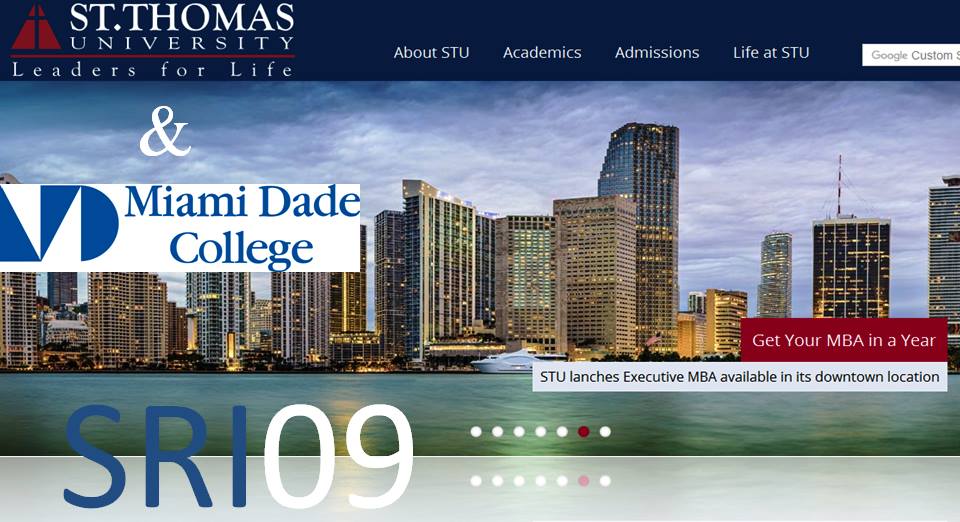
Welcome Message
Nine years have gone since the First STU-MDC Summer Research Institute (SRI) Symposium. Over the years, faculty members from both institutions, School of Science, Technology, and Engineering Management of Saint Thomas University (STU) and Miami Dade College (MDC), have partnered to provide undergraduate students hands-on experiences and computational projects that will prepare them for the new challenges of the modern world and the job market. The commitment of the faculty and staff of the School of Science, Technology and Engineering Management has permitted to introduce students into modern techniques of molecular biology, statistical analysis, mathematical modeling, computational physics, bioinformatics, nano sciences and a large variety of characterization techniques. During this last edition, students exchanged experiences with researchers from University of Miami, Florida International University (FIU) and also from NASA,
For the second time, this year, the memories of the SRI will be hosted online by the MOL2NET conference series. It means, that all communications will be published online at Sciforum platform. All presentations will be peer reviewed and a DOI number will be assigned. MOL2NET conference of Sciforum is one of the platforms with international recognition for scientific exchange. The variety of topics included within this new edition acknowledges the inter-disciplinarity, teamwork, and networking of modern science. Feel free to contact researchers and participants to foster more collaboration efforts. St. Thomas University School of STEM is open to new ventures and joint ventures. Interested to see previous edition can follow the link SRI-08 and witness the quality of 38 submissions with a total of 21 publications. The new edition SRI-09 received a total of 27 submissions.
Special thanks to our partner Miami Dade College (MDC) and the grant STEM-SPACE P03C1160161. The received contributions provided funding for equipment, logistics, and minor activities associated with the SRI. Ten speakers from and local Technological companies came to St. Thomas to share their wisdom as an in kind contribution.
Thank you for your support!
SRI Chairman
Prof. Dr. David Quesada, Associate Professor of Physics, (MOL2NET Committee)
Saint Thomas University (STU), Carnival Building, Room 117, Miami, FL, USA.
Email: dquesada@stu.edu
Scientific Committee
Prof. Dr. Alexis Tapanes-Castillo, Assistant Professor of Biology
School of Science, Technology and Engineering Management,
St. Thomas University (STU), Miami, FL, USA.
Email: atapanes-castillo@stu.edu
Prof. Dr. Reinaldo Sanchez-Arias, Assistant professor of Mathematics,
School of Science, Technology and Engineering Management,
St. Thomas University (STU), Miami, FL, USA.
Email: rsanchez-arias@stu.edu
Prof. Dr. Luis Fernandez-Torres, Assistant Professor of Chemistry,
School of Science, Technology and Engineering Management,
St. Thomas University (STU), Miami, FL, USA.
Email: lfernandez-torres@stu.edu
ICT, Bioethics, and Law Advisory Chair
Dr. Aliuska Duardo-Sanchez (Law.Lic., Ph.D. Legal Informatics)
Prof. of Law, Program Juan de La Cierva (JdC) Post-Doctoral Research Fellow,
Department of Public Law, University of Basque Country (UPV/EHU),
Campus Biscay, Leioa, 48940, Spain.
Advisory Chair
Prof. Dr. González-Díaz H., IKERBASQUE Professor
(1) Department of Organic Chemistry II, University of the Basque Country UPV/EHU , 48940, Leioa, Biscay, Spain.
(2) IKERBASQUE, Basque Foundation for Science , 48011, Bilbao, Biscay, Spain.![]() ORCID: https://orcid.org/0000-0002-9392-2797
ORCID: https://orcid.org/0000-0002-9392-2797
[SRI09 PHOTO GALLERY]

USINEWS Scientific Committee
Prof. Ashok. K. Dubey, Netaji Subhas University of Technology, New Delhi, India.
Prof. Kunal Roy, Dept. of Pharmaceutical Technology, Jadavpur University, Kolkata, India.
Prof. Natalia D.S. Cordeiro, Dept. of Chem. & Biochem., University of Porto, Porto, Portugal.
Dr. Shameer Khader, Dept. of Med. Info. and Research Informatics, Northwell Health, NY, USA.
Dr. Rajeev K Singla (M.Pharm), Sichuan University SCU, West China Hospital, China.
Dr. Supratik Kar, Interdisciplinary Center for Nanotoxicity, Jackson State University, USA.
Prof. Arun Garg, K.R. Mangalam University, Gurugram, India.
Prof. Saahil Arora, K.R. Mangalam University, Gurugram, India.
Dr. Pravin Ambure, ProtoQSAR SL, CEEI Valencia, Valencia, Spain.
Prof. Varadaraj Bhat G, Manipal College of Pharmaceutical Sciences, Karnataka, India.
Prof. Kirtan Dave, Center for Interdisciplinary Studies in Science and Technology, Sardar Patel University, India.
Dr. Amit Kumar Halder, Dept. of Chem. & Biochem., University of Porto, Porto, Portugal.
Prof. Nitin Sapre, Shri Govindram Seksaria Institute of Technology and Science, Indore, India.
Dr. Girinath G. Pillai, Zastra Innovations, Bengaluru, Karnataka, India.
Dr. Kamal Dua, University of Technology Sydney, Australia.
Prof. Gangarapu Kiran, Dept. of Pharmacy, Anurag Group of Institutions, Ghatkesar, India.
Dr. Girish Gupta, Director-Research and Development, Sri Sai College of Pharmacy, India.
Prof. Ajit Singh, Patna Women's College,Patna, Bihar 800001, India India.
Dr. Baishakhi Dey, Indian Institute of Technology Kharagpur, India.
USEDAT Scientific Committee

People listed as collaborators and/or collaborating professors of the USEDAT school project are those who have: [i] acted as lecturer or coordinator of one of the courses; [ii] Acted as chairperson of one of the workshops, [iii] offered institutional and/or hosting support, [iv] acted as tutor and/or have sent at least one student to participate in courses of other centers.
USEDAT Professors/Collaborators [North America]:
Prof. Eugene Muratov i,ii, Eshelman School of Pharm., Univ. of North Carolina (UNC), Chapell Hill, USA.
Assist. Prof. Matthew M. Montemore i,iii,iv, Chem. & Biomol. Eng., Tulane University, New Orleans, USA.
Prof. James Robert Green i,ii,iii,iv, Dept. of Systems and Comput. Eng., Carleton University, Canada.
Prof. Terace Fletcher i,ii,iii,iv, Northeast Lakeview College, University of Texas, San Antonio, TX, USA.
USEDAT Professors/Collaborators [Europe]:
Prof. Humbert Gonzalez-Diaz (USEDAT Coord.)i,ii,iii,iv , Prof. Sonia Arrasate i,ii,iii,iv, Prof. Esther Lete (PhD Coord.)i,ii,iii,
Prof. Nuria Sotomayor (MSc Coord.)i,ii,iii, Prof. Fernando Plazaola (Dean)iii, Prof. Ma. Isabel Moreno (Dir. Dept.)ii,iii,
Dr. Aliuska Duardo (Fac. Law)i,ii,iii,iv, Univ. of The Basque Country (UPV/EHU), Leioa, Basque Country, Spain.
Prof. Cristian R Munteanu i,ii,iii,iv, Prof. Alejandro Pazos i,ii,iii,iv, University of Coruña (UDC), Coruña, Spain.
Dr. Yasset Perez-Riverol i,ii, European Bioinformatics Institute (EMBL-EBI), Cambridge, United Kingdom.
Prof. Pedro L. Fernandes i,ii,iii,iv, Bioinformatics Training Coordinator, Instituto Gulbenkian de Ciencia (IGC), Portugal.
Prof. Amaury Pérez Martínezii,iii, Amazon State Univ. (UEA), Ecuador.
Prof. Eduardo Tejera i,ii,iii,iv, Prof. Yunierkis Perez Castillo i,ii,iii,iv (Bio-Cheminformatics Group), Prof. Vinicio Armijos iii,iv,
MSc. Emilia Vasquez i,ii,iii,iv (Biotechnology), Universidad de Las Americas (UDLA), Quito, Ecuador.
Prof. Marcus T Scotti i,ii,iii, Dir. Cheminformatics Lab., Universidade Federal da Paraíba (UFPB), Brazil.
Prof. Esvieta Tenorio-Borroto i,ii,iii,iv , Universidad Autónoma del Estado de México (UAEM), Mexico.
Prof. Boris Mederos iii,iv, Dept. Phys. and Mathematics, Univ. Autónoma de Ciudad Juárez (UACJ), México.
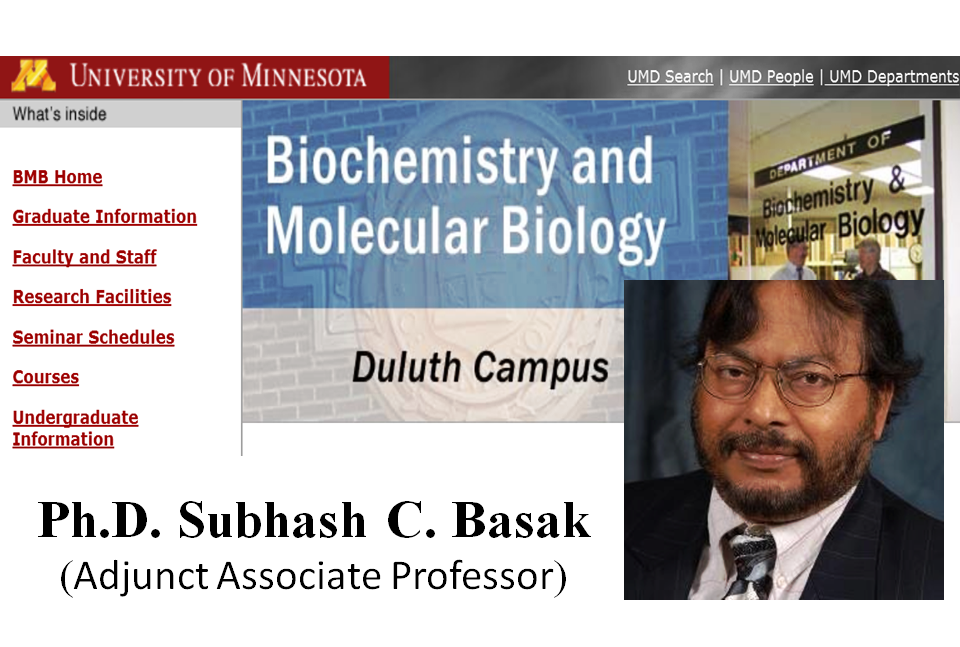
Dr. Subhash C. Basak, (1) Ph.D. Senior Scientist at Natural Resources Research Institute, Center for Water and the Environment (CWE), Duluth, MN, USA. (2) Adjunct Associate Professor, Department of Chemistry, University of Minnesota Twin Cities, MN, USA.

Prof. Dr. David Quesada, Director of Dept. of Mathematics, SRI Series Founder Chairman
Miami Dade Colege (MDC), Miami, FL, USA.
Email: dquesada@mdc.edu

 Prof. Humbert González-Díaz, IKERBASQUE Professor (MOL2NET & USEDAT Founder Chairman), Email:mol2net.chair@gmail.com,
Prof. Humbert González-Díaz, IKERBASQUE Professor (MOL2NET & USEDAT Founder Chairman), Email:mol2net.chair@gmail.com, (1) Dept. of Organic Chemistry II, University of the Basque Country UPV/EHU , 48940, Leioa, Biscay, Spain.
(2) IKERBASQUE, Basque Foundation for Science , 48011, Bilbao, Biscay, Spain.
ORCID:https://orcid.org/0000-0002-9392-2797
ICTs, Bioethics & Regulatory Affairs Chairperson
Dr. Aliuska Duardo-Sanchez (Law.Lic., Ph.D. TICs & Legal Sciences)
PANELFIT European Commission Project Manager. Research Group: Chair in Law and The Human Genome,
Dept. of Public Law, University of Basque Country (UPV/EHU), Campus Biscay, Leioa 48940, Spain.
Show all published submissions (19) Hide published submissions (19)
Submissions
List of Papers (19) Toggle list
09. NATMODECO-02: Nat. Prod., Molec. Sci., Develop. Sust., Environ., Eco., and Econ. Congress, Puyo, Ecuador-Porto, Portugal, 2017.
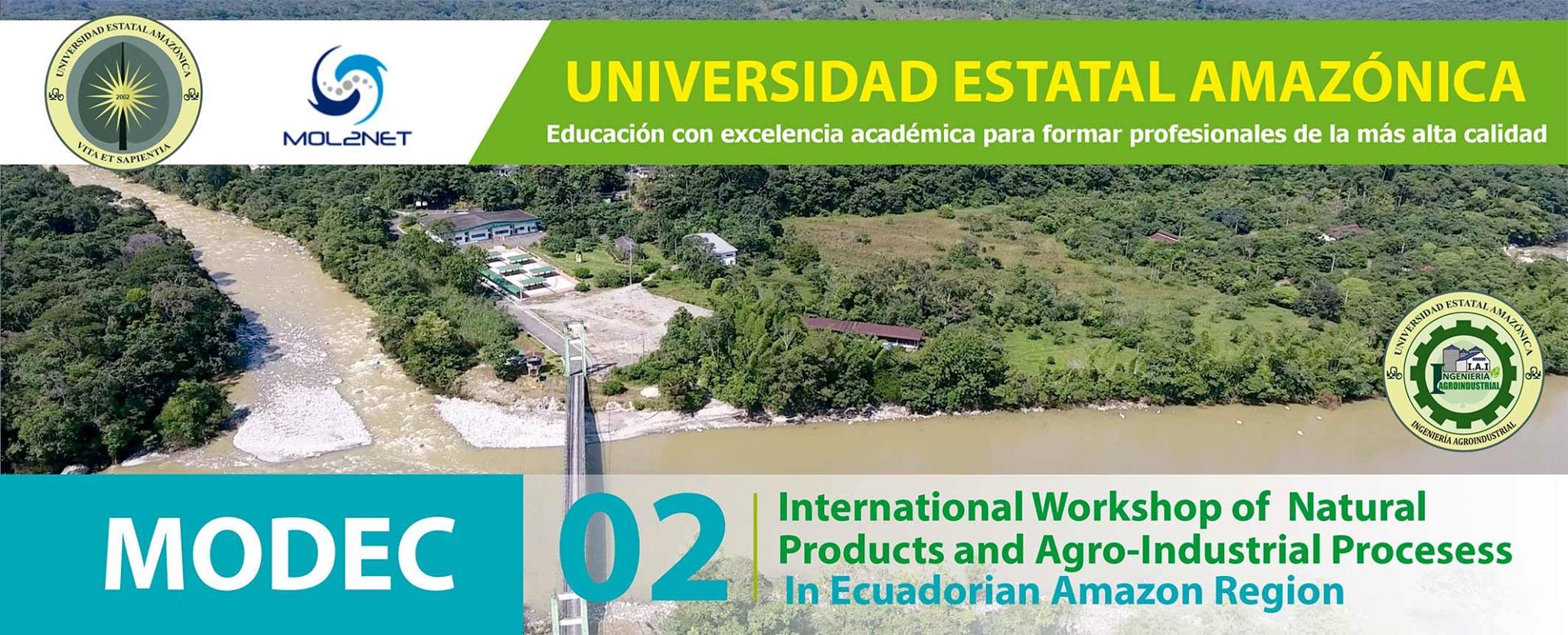
Welcome to the NATMODECO-02: Nat. Prod., Molec. Sci., Develop. Sust., Environ., Eco., and Econ. Congress, From Amazon to Oceans, Puyo, Ecuador-Porto, Portugal, 2017. This workshop focus on the research of climate impact, preservation, and environment-friendly industrial development of forests and oceans. The workshop promotes the application of the Multidisciplinary Sciences for climate research and to the development of natural products and agro-industrial processes in both Ecuadorian Amazon and Pacific and Atlantic Oceans and coastal regions. It involves methodologies ranging from experimental chemistry and biomolecular sciences, computational methods, economical, social, bioethics, regulatory and legal issues.
Partners & Promoters. This is a trans-atlantic inter-university workshop. On the Americas' side the workshop is chaired and co-hosted by professors of the Amazon State University's (UEA), Puyo, Amazon, Ecuador. From Europe's side the workshop is chaired and co-hosted by researchers and professors of the Interdisciplinary Centre of Marine and Environmental Research (CIIMAR), University of Porto (UPORTO), Porto, Portugal. The workshop was founded and is co-chaired and promoted by researchers of the University of The Basque Country (UPV/EHU) endowed by IKERBASQUE, Basque Foundation for Science, Bilbao, Basque Country, Spain.
Host Conference. The workshop is associated to and hosted online by the MOL2NET International Conference Series on Interdisciplinary Sciences, ISSN: 2624-5078, MDPI SciForum, Basel, Switzerland. This conference is hosted online by the SciForum platform supported by Multidisciplinary Digital Publication Institute (MDPI), Basel, Switzerland with roots in the Molecular Diversity Preservation International (MDPI) institute. Please, contact the workshop chairmen for further details.
Working Languages. English is the main working language of the workshop. However, as a North-Ibero-American-Europe inclusive conference the workshop aims to accept papers to be published in multiple languages spoken on the countries, states, and communities of the entire North-Ibero-American-Europe area of influence. It involve, but is not limited to: Ecuador, France, México, Brazil, Spain, Portugal, USA, Canada, Chile, Basque Country, Catalunya, Valencia, Galicia, etc. Consequently, we accept papers on the following languages: English, Spanish, French, Portuguese, Basque (Euskera), Catalá / Valenciano, and Galego. We also accept bi-lingual posters in two-column format, e.g, English-Basque, English-Spanish, France-English, English-Portuguese, Spanish-Galego, etc. Other languages than those cited above may be considered but it could conditioned to the fluency of the experts in the revieweing panel.
Publication Modalities. There are two separted routes for publication. Firstly, all communications submited directly to the workshop will be Published Online Free of Charge open year round. In addition, all authors are invited to submit by separate (optional) full paper versions of their communications to the MDPI journal associate special issue, in this case (APC apply). In th first case, communications submitted to the workshop are expected to be short papers or posters consisting of 1-3 pages. Be aware that the submission is a two step process. First you must register and submit a tentative title, authors list and abstract. Next, you need to submit your full publication upon acceptance of the abstract by the committee. Full communications submited to workshop will be in the Sciforum platform, with doi number as soon as possible upon acceptance.
Workshop Topics of Interest: The topics of the conference, include, but are not limited to: Marine chemical pollution; Marine and Forest Microorganisms; Marine and Forest environment; Metabolomics; Microbial biofilms formation. Experiental and Computational chemistry, Cheminformatics, and Bioinformatics of Forest and Marine Natural products. Mathematical modelling of Natural, Climate, Biotechnological, Agricultural, and Environmental Process. Organic and Functional Foods of Forest and Ocean origin. BioTrade: Sustainability and Trading of Natural Products of the Amazon and Coastal regions. Production systems with agro-business and forestry purposes or biomass for energy purposes. Environmental impacts in Forest and Ocean of Climate Changes and Industrial exploitation. Geographic Information Systems (GIS) for Climate and Land cover monitoring and forecasting. Agro-industrial development processes.
- Abstracts submission until Oct-01.
- Abstract acceptance until Oct-03.
- Communications submission until Nov-01.
- Communications acceptance until Nov-15.
- Communications publication until Nov-30.
Authors liability. Before to submit your work be aware that the editorial publication model of this workshop is similar to a PREPRINTservice. It means that works presented here have to be considered only as preliminary communications and not as final post-print versions of journal papers. In this sense, even when all the works published are revised by at least one member of the committee and/or external reviewer this level of revision checks only apparent scientific soundness and general scientific interest. In a second level, collective post-publication review, the works published may receive comments (published in the form of posts) from all the participants registered in the conference. The authors are prompted to use all these opinions to write the full versions of their works and submit them to publication in a peer-reviewed scientific journals according to SciForum copyright rules. In any case, the authors are the only one responsible of the veracity of the contents, checking similarity to other works, citing properly previous works, etc.
Honor & Executive Chairpersons

Dr. Guillermin Agüero, CIIMAR, Interdisciplinary Centre of Marine and Environmental Research, University of Porto, Portugal.
Email: gchapin@ciimar.up.pt

Prof. Amaury Pérez Martínez , Universidad Estatal Amazónica, Ecuador.
Email: amperez@uea.edu.ec
Founder Chairpersons
Dr. Gerardo M. Casañola Martin, North Dakota State University, ND, Fargo, USA.
Prof. Oscar M. Rivera Borroto, Houston Community College, Houston, TX, USA.
HQs Honor Advisory Committee
Prof. Agostinho Antunes, CIIMAR, Interdisciplinary Centre of Marine and
Environmental Research, University of Porto, Scientific-Technical Director of
Matosinhos Environmental Center (CMIA), Matosinhos, Portugal.
Prof. Dr. C. Julius Caesar Vargas Burgos, Full Professor
Rector of Amazon State University (UEA), Puyo, Ecuador
Prof. Reynaldo Alemán Pérez, Scientific Director
Universidad Estatal Amazónica, Ecuador.
Honor Advisory Committee
Prof. Eugenio Uriarte Villares, Universidad de Santiago de Compostela, Spain.
Prof. Pedro Fernández de Córdoba Castellá, Universidad Politécnica de Valencia, Spain
Scientific Committee Abroad
Dr. Maria Joao Matos, Postdoc Universidad de Santiago de Compostela, Spain,
Former PostDoc Dept. of Chemistry, University of Cambridge, United Kingdom.
PhD. Dany Domínguez Pérez, CIIMAR Centre, University of Porto, Porto, Portugal.
Prof. Juan Esteban Miño Valdés, Universidad Nacional de Misiones, Argentina.
Prof. Luis E. Arteaga-Pérez, Universidad del Bío-Bío: Concepción, Chile.
Prof. Yannay Casas Ledón, Concepción University, Chile.
Prof. Luis E. Arteaga-Pérez, University of Bio-Bio, Chile.
National Scientific Committee (Ecuador)
Prof. Yovani Marrero-Ponce, University San Francisco de Quito, Quito, Ecuador.
Prof. Eduardo Tejera, Bio-Cheminformatics, niversidad de Las Americas (UDLA), Quito, Ecuador.
Prof. Vinicio Armijos , Universidad de Las Americas (UDLA), Quito, Ecuador.
Prof. Yunierkis Pérez-Castillo, Universidad Técnica Particular de Loja, Ecuador.
Prof. Alejandro Cabrera Andrade, Universidad de Las Americas (UDLA), Quito, Ecuador.
Prof. Emilia Vasquez, Biotechnology, Universidad de Las Americas (UDLA), Quito, Ecuador.
Prof. Neyfe Sablón Cossío, Universidad Técnica de Manabí, Ecuador.
Prof. Karel Dieguez Santana, Universidad Estatal Amazónica, Ecuador.
Prof. Manuel Lazaro Pérez Quintana, Universidad Estatal Amazónica, Ecuador.
Prof. Matteo Radice, Universidad Estatal Amazónica, Ecuador.
Prof. Pedro Jesús Lopez Trabanco, Universidad Estatal Amazónica, Ecuador.
Prof. Viviana Fernanda Quevedo Tumailli , Universidad Estatal Amazónica, Ecuador.
Eng. Delfín Bernabé Ortega Tenezaca, Universidad Estatal Amazónica, Ecuador.
Prof. Dagoberto Acosta Iglesias, Universidad Estatal Amazónica, Ecuador.
Prof. Manuel Lazaro Pérez Quintana, Universidad Estatal Amazónica, Ecuador.
Prof. Javier Dominguez Brito, Universidad Estatal Amazónica, Ecuador.
Prof. Maria Isabel Viamonte Garces, Universidad Estatal Amazónica, Ecuador.
Prof. Estela Guardado, Universidad Estatal Amazónica, Ecuador.
Prof. Laura Scalvenzi, Universidad Estatal Amazónica, Ecuador.
Prof. Luis Ramón Bravo Sánchez, Universidad Estatal Amazónica, Ecuador.
Prof. Reinier Abreu Naranjo, Universidad Estatal Amazónica, Ecuador.
Prof. Yasiel Arteaga Crespo, Universidad Estatal Amazónica, Ecuador.
Prof. Yudel García Quintana, Universidad Estatal Amazónica, Ecuador.
Prof. Carlos Alfredo Bravo Medina, Universidad Estatal Amazónica, Ecuador.
Prof. Víctor Rodrigo Cerda Mejía, Universidad Estatal Amazónica, Ecuador.
Honour Publication Chairman
Prof. González-Díaz H., IKERBASQUE Professor,  https://orcid.org/0000-0002-9392-2797, Email: mol2net.chair@gmail.com
https://orcid.org/0000-0002-9392-2797, Email: mol2net.chair@gmail.com
(1) Dept. of Organic and Inorganic Chemistry and Basque Center for Biophysics, University of the Basque Country UPV/EHU , 48940, Leioa, Biscay, Spain. (2) IKERBASQUE, Basque Foundation for Science , 48011, Bilbao, Biscay, Spain.
ICTs & Regulatory Affairs Chairperson
Dr. Aliuska Duardo-Sanchez (Law.Lic., Ph.D. TICs & Legal Sciences),
Chair in Law & The Human Genome Research Group, Faculty of Law,
University of The Basque Country UPV/EHU, Leioa (Bilbao), Biscay,
PANELFIT H2020, Project Manager & EDC Board Coordinator,
Europe Commission.
Congress Chair
Dr. Amaury Perez Martinez
04. MOL2NET'17 ABSTRACTS, REVIEWWWERS Post-Publication Brainstorming and Associated Workshops

MOL2NET'22 Transversal Workshops



About. MOL2NET is the online host and publisher of the works presented at The Meeting of Young Investigators of Computational Structural Biology (EJIBCE) aims to bring together the Portuguese scientific community in this area in a meeting free of charge, in order to provide a space for discussion and sharing without commitments. See the details of the present and previous editions, committee, participants, speakers, etc., in the homepage [EJIBCE Editions].
Mission & Objectives. The sharing and discussion of ideas are the seeds of a strong scientific community. Given the current pandemic situation, it becomes increasingly necessary to boost and stimulate a spirit of openness and collaboration between the various research groups in Portugal. Among other factors, this panorama has shown the contribution and growing need for researchers capable of making the most of computational resources to generate quick, effective and rational responses to real, urgent and unavoidable problems.
This contact with Portugal becomes important when returning to the country after a doctoral, post-doctoral, or any other prolonged period abroad. On the other hand, there are those who want to stay abroad but at the same time cultivate a close relationship with science in Portugal. But, which groups exist in the area of Computational Structural Biology in Portugal? And what research is carried out in these groups? Questions arise naturally and the answers are not always simple to find. This initiative aims to answer some of these questions. It intends to make known what is best done in the area of Computational Structural Biology in Portugal, and on the other hand, to make known what Portuguese researchers living abroad are studying. In this way, we want to provide a space where projects and results can be disseminated and discussed, with a view to stimulating collaborations (nationally and internationally) and broadening the horizons of Computational Structural Biology in Portuguese.
Statement of responsibility. All material and services on this website are provided without any guarantee. The content published on these pages may contain errors for which the organization is not responsible. The content is also subject to periodic changes without prior notice. Any doubts and questions should be addressed to the organization by email (ejibce@gmail.com). Registering for this event implies acceptance of these conditions.
Acerca. O Encontro de Jovens Investigadores de Biologia Computacional Estrutural (EJIBCE) tem como objectivo reunir a comunidade científica portuguesa nesta área num encontro livre de encargos, de forma a proporcionar um espaço de discussão e partilha sem compromissos.
Missão & Objectivos. A partilha e discussão de ideias são as sementes para uma comunidade científica forte. Dada a presente situação pandémica, torna-se cada vez mais necessário dinamizar e estimular um espírito de abertura e colaboração entre os vários grupos de investigação em Portugal. Entre outros fatores, este panorama veio mostrar o contributo e crescente necessidade de investigadores capazes de rentabilizar os recursos computacionais para a geração de respostas rápidas, eficazes e racionais a problemas reais, urgentes e incotornáveis. Este contacto com Portugal torna-se importante no momento de voltar ao país após um doutoramento, um pós-doutoramento, ou qualquer outro período prolongado no estrangeiro. Por outro lado, há quem queira continuar no estrangeiro mas simultaneamente cultivar uma relação de proximidade com a ciência em Portugal. Mas, que grupos existem na área da Biologia Computacional Estrutural em Portugal? E que investigação é levada a cabo nesses grupos? As perguntas surgem naturalmente e as respostas nem sempre são simples de encontrar. Esta iniciativa pretende dar resposta a algumas destas perguntas. Pretende dar a conhecer o que de melhor se faz na área da Biologia Computacional Estrutural em Portugal, e por outro lado, dar a conhecer o que estudam investigadores portugueses radicados no estrangeiro. Desta forma, queremos proporcionar um espaço onde se possam divulgar e discutir projectos e resultados, com vista a estimular colaborações (a nível nacional e internacional) e a alargar os horizontes da Biologia Computacional Estrutural em Português.
Termo de Responsabilidade. Todo o material e serviços nesta página web são prestados sem qualquer garantia. O conteúdo publicado nestas páginas pode conter erros pelos quais a organização não se responsabiliza. O conteúdo está também sujeito a mudanças periódicas sem direito a pré-aviso. Quaisquer dúvidas e questões devem ser endereçadas à organização por correio electrónico (ejibce@gmail.com). O registo neste evento implica a aceitação destas condições.

Saint Thomas University (STU), Carnival Building, Room 117, Miami, FL, USA.
Email: dquesada@stu.edu
School of Science, Technology and Engineering Management,
St. Thomas University (STU), Miami, FL, USA.
Email: atapanes-castillo@stu.edu
School of Science, Technology and Engineering Management,
St. Thomas University (STU), Miami, FL, USA.
Email: rsanchez-arias@stu.edu
School of Science, Technology and Engineering Management,
St. Thomas University (STU), Miami, FL, USA.
Email: lfernandez-torres@stu.edu
Prof. of Law, Program Juan de La Cierva (JdC) Post-Doctoral Research Fellow,
Department of Public Law, University of Basque Country (UPV/EHU),
Campus Biscay, Leioa, 48940, Spain.
(2) IKERBASQUE, Basque Foundation for Science , 48011, Bilbao, Biscay, Spain.
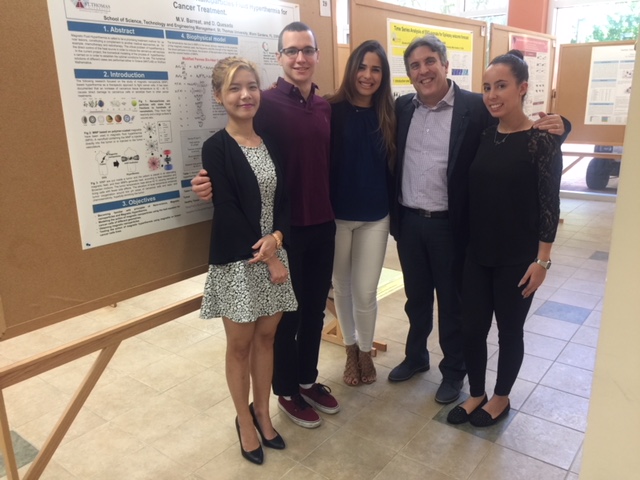
Show all accepted abstracts (52) Hide accepted abstracts (52)
List of Accepted Abstracts (52) Toggle list























































